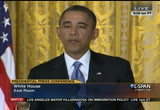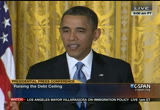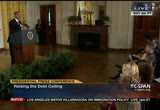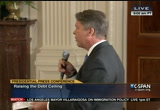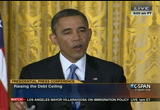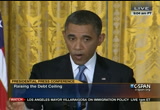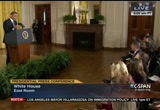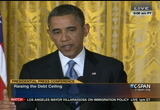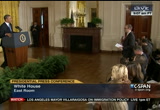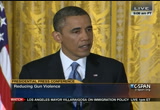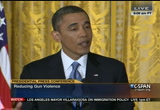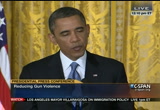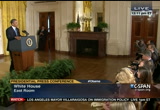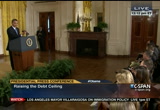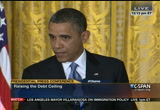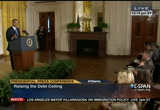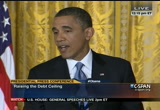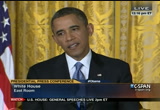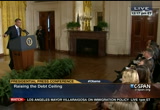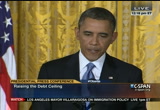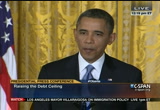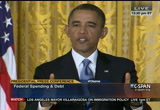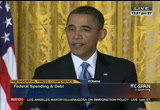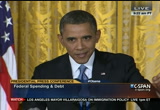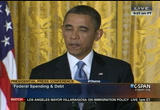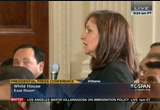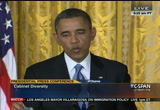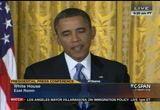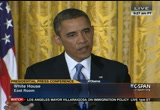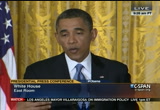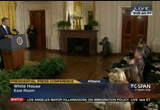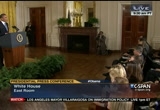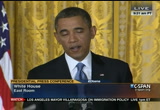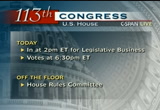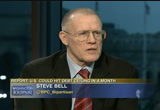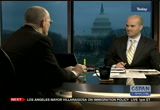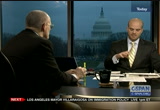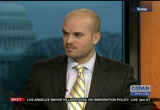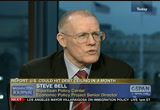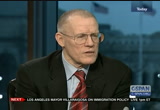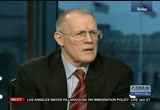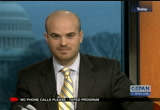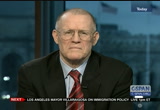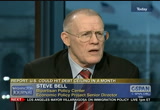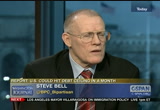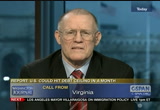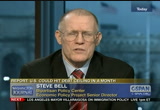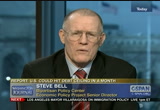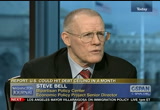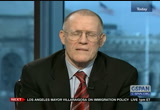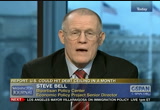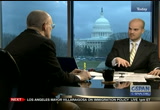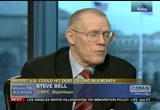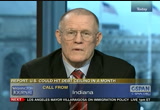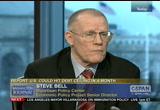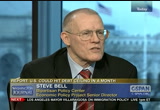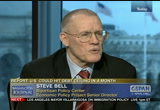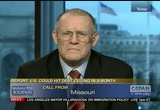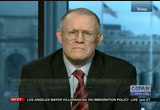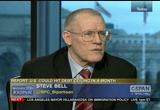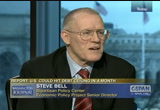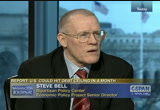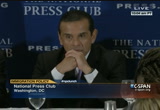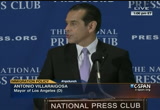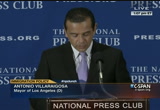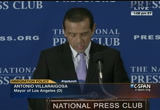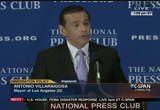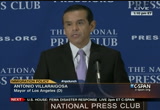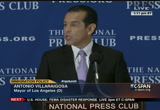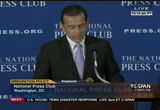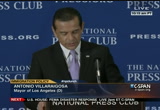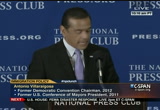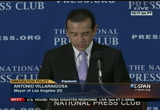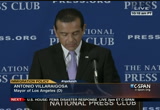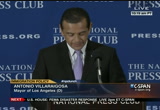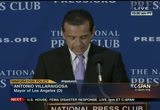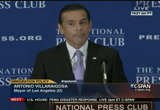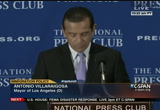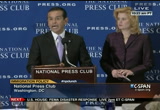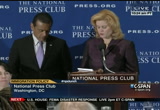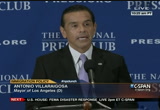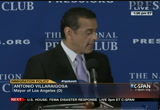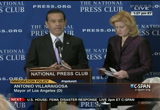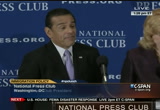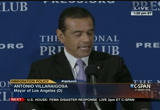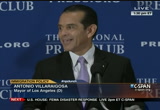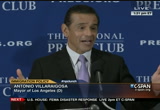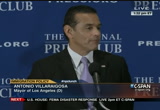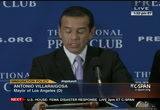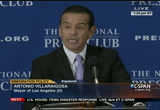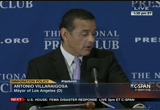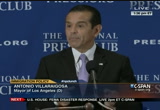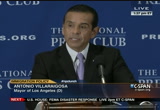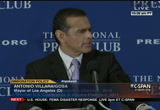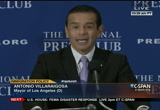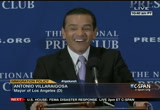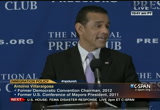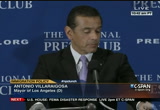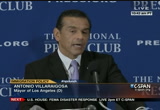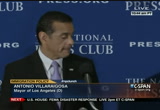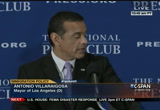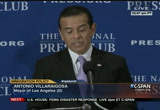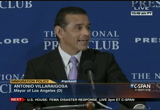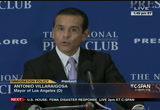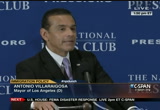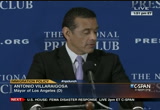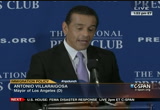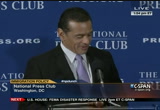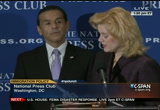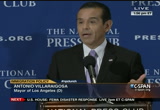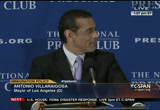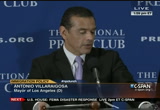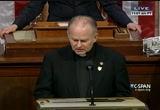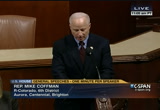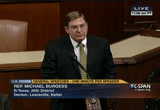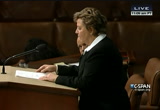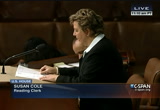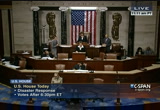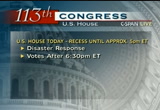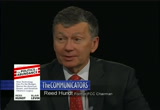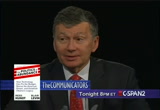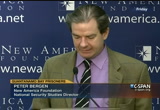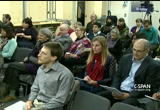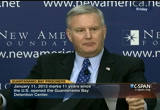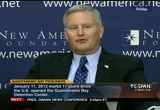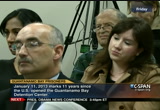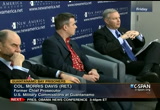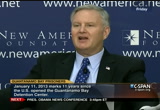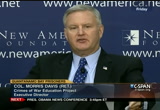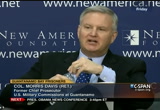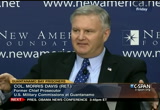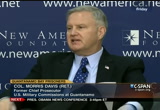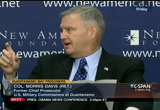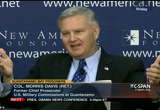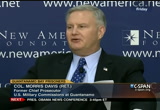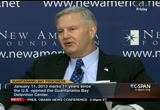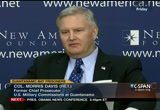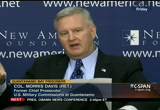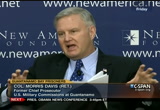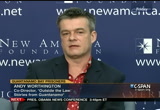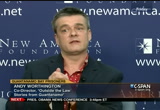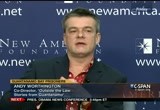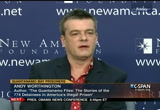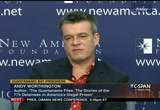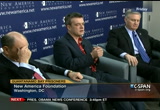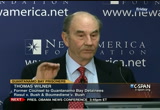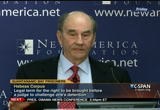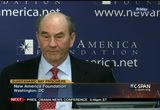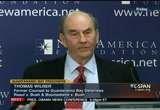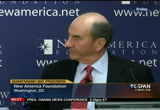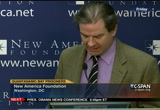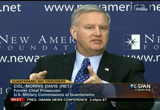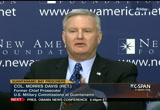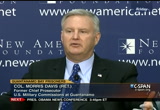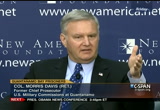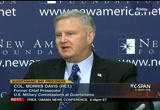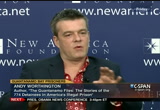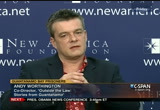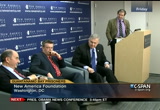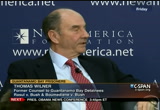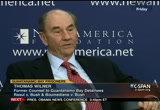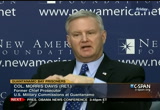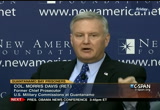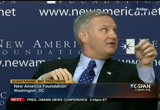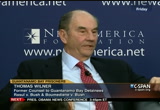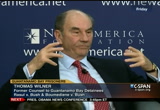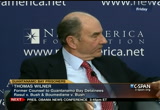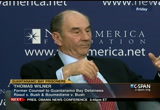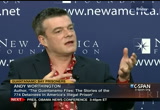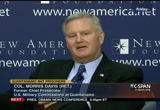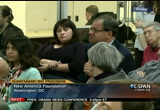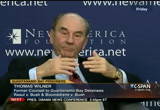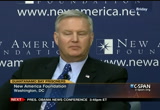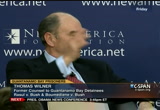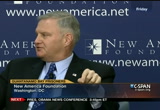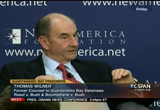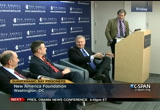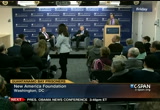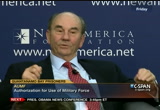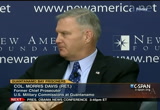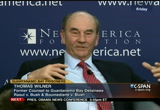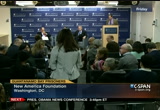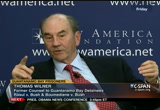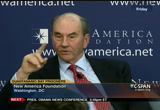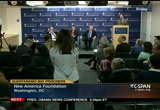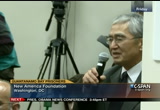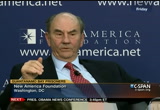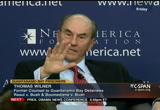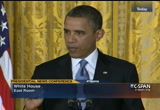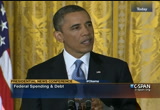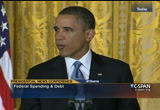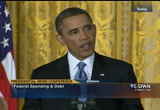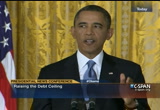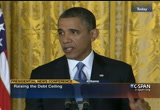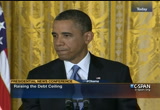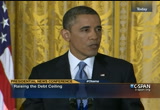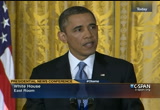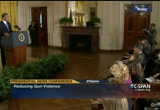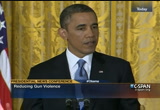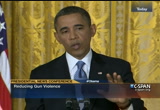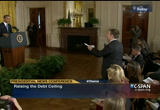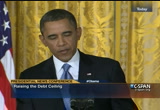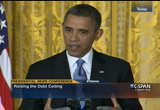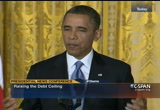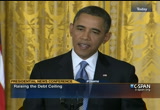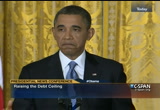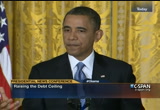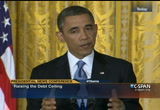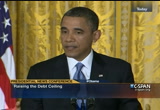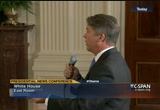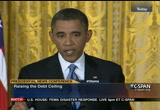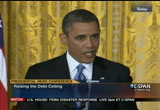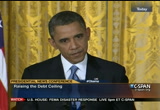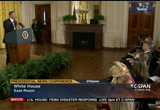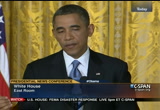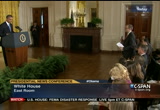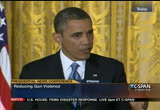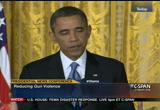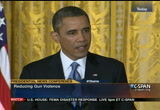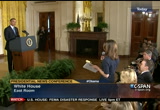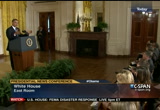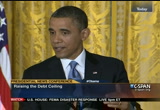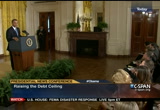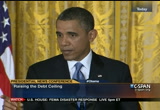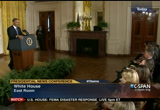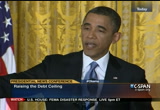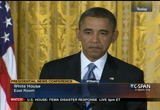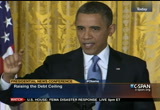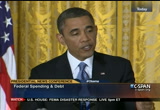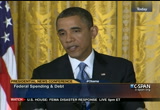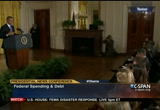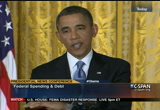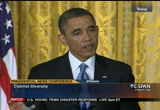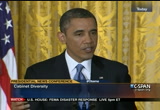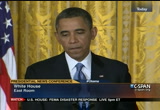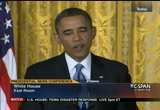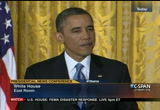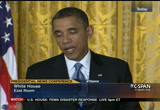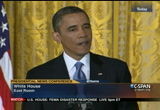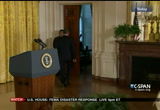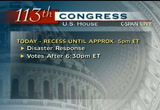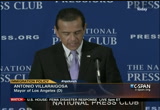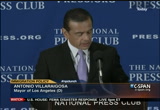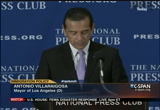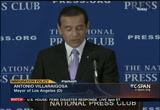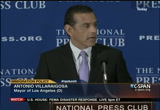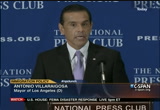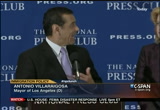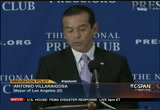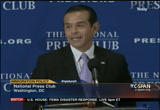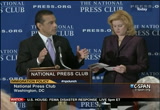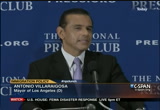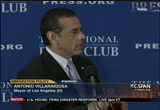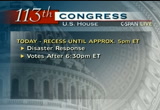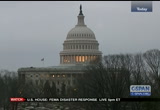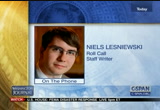tv Public Affairs CSPAN January 14, 2013 12:00pm-5:00pm EST
12:00 pm
this has been done and not the we're going to do it this time. what i am saying to you is there is no simpler solution, note ready, credible solution other than congress either give me the authority to raise the debt ceiling, or exercise the responsibility that they have kept for themselves and raise the debt ceiling, because this is about paying the bills. this is not a complicated concept. you do not go out to dinner and then eat all you want and then leave without paying the check. if you do, you are breaking the law. congress should think about the same way the american people do.
12:01 pm
if congress wants to say maybe we should go to a more modest restaurant, that's fine. in order to curb our appetite, we're not going to pay the people who already provided the insurance, already front of the money. that is not showing any discipline. that is just not meeting obligations. you cannot do that. that is not a credible way to run the government. we cannot going from crisis to crisis when there is a path in front of us that require stability and compromise. that's how this goes. that is how this needs to work.
12:02 pm
>> thank you, mr. president. binding votes for the debt ceiling can sometimes be complicated. in previous aspects of american history, president reagan, president h. w. bush, president clinton all signed debt reduction deals. you have done this three times. four times was related to budget maneuvers. what many people are curious about is this new madam a desire on your part not to negotiate but that seems to conflict with the modern era of presidents with the debt ceiling and your own history. does that suggest we will go into a default situation because no one is talking about how to resolve this? >> no, major. getting votes for this is always
12:03 pm
difficult. i went through this and just last year. what is different as we never saw a situation as we saw last year in which certain groups in congress took such an absolutist position that we begin within a few days of defaulting. the fact of the matter is that we have never seen the debt ceiling used in this fashion with the notion is that we might default unless we get 100% of what we want. that has not happened. as i indicated before, and have bid have a conversation on how we reduce our deficits further in a sensible way. -- i would have a conversation about how to reduce our deficits in a sensible way. we can talk about how we can make sure we finance our workers
12:04 pm
getting properly trained and are schools getting the education they deserve. there is a whole growth agenda that is important does well. -- as well. what you have not seen as the notion that has been presented so far by the republicans that deficit reduction will only cover spending cuts, that we will raise the debt ceiling dollar for dollar on spending cuts. there are a whole set of rules that have been established that are impossible to meet without doing severe damage to the economy. we're not going to put ourselves in a position where, in order to pay for the spending we have already incurred, where the two options are we were way to either profoundly hurt the economy, hurt seniors, hurt kids
12:05 pm
trying to go to college or we will blow up the economy. we will not do that. not whatever congress does. they will have to send me something that is sensible. we should not be doing this in a one-three month time when. why should we do that? where the united states of america. we cannot manage our affairs in such a way that we pay our bills and provide certainty in terms of how we pay our bills? look. i do not think anyone would consider my position on reasonable. major, i am happy to have a conversation about how we reduce our deficits. i'm not going to have a monthly
12:06 pm
or every three months conversation about whether or not we pay our bills. that in and of itself does severe damage. even the threat of default hurts our economy. it hurts our economy as we speak. if we want to have a conversation about how to reduce our deficit, let's do it. we have been having that for the last two years. we just had an entire campaign about it. the american people agreed with me that we should reduce our deficits in a balanced way that takes into account the need to grow this economy and put people back to work. despite that conversation and despite the election results, the position that has been taken on the part of house republicans is that we have to do it our way. if we don't, we simply will not pay america's bills.
12:07 pm
that cannot be a position that is sustainable over time. it's not one that is good for the economy now and it will not be the precedent i want to establish not just for my presidency but for the future. even if it was on the other side. democrats do not like voting for the debt ceiling yet you never saw a situation in which democrats suggested that we would go ahead and all that we did not get our way 100%. that's not how it works. >> on the issue of guns, given how typical it will be, impossible, to get any gun- control measure passed through this congress, what are you willing or able to do using the powers of your presidency to act without congress? i would also like to know what you make of these long lines
12:08 pm
we're seeing at gun shows and gun stores all around the country? even in connecticut, applications are up since the shooting. >> my understanding of the vice- president will provide a range of steps we could take to reduce gun violence. some of them will require legislation. some of them i can accomplish through executive action. i will be reviewing those today. i'm confident there are some steps we can take that do not require legislation within my ability as president. we have the possibility to reduce gun violence and then i'm going to take it. for example, how we gather data
12:09 pm
on guns that ball into the hands of criminals and how to track it more effectively. there may be some steps we can take administratively. as far as people lining up to purchase more guns, i think that we have seen, for some time now, that those who oppose any common-sense gun-control or gun safety measures have a pretty effective way of ratcheting up fear on behalf of gun owners that somehow the federal government is going to take all of your guns away. economicrobably an element to that. it is obviously good for business. but i think those of us who look
12:10 pm
at this problem have repeatedly said that responsible gun owners, people who have a gun for protection, hunting, sportsmanship, they did not have anything to worry about. the issue here is not whether or not we believe in the second amendment. the issue is if there are sensible steps we can take to make sure that somebody like the individual in newton cannot walk into a school and gunned down a bunch of children in a shockingly rapid action. surely we can do something about that. part of the challenge we confront is even the slightest hint of some sensible, responsible legislation in this
12:11 pm
area fans this notion that somehow -- here it comes. everyone's guns will be taken away. it is unfortunate, but if you look over the first four years of my administration, we have tried to enforce the laws already on the books, but it would be pretty hard to argue that somehow gun owners have had their rights infringed. excuse me? as i said, i think it is the fear of a ban on guns by those who are worried about the possibility of legislation getting out there. julianna goldman.
12:12 pm
>> thank you, mr. president. i want to come back to the debt ceiling. in the summer 2011, you said you would not negotiate and you did. last year, he said he would not extend any of the bush tax cuts for the wealthy and you did. you say you're not going to negotiate this year, why should house republicans take that seriously and think if we did into the 1 minute until midnight scenario that you will not back down? >> first of all, julianna, let's take the example of this year's fiscal cliff. i did not say we would not have any conversations out all about extending the bush tax cuts. i said we would not extend them for the wealthy. we did not. now, you can argue that during the campaign i said i set the criteria for "wealthy" at $250
12:13 pm
on dollars and we ended up being a $400,000, but millionaires are paying more taxes, just as i said. from the start, my concern was making sure we had a tax code that was fair and protected the middle class. when biggest priority is making sure that middle-class taxes did not go up. the difference between this year and 2011 is the fact that we have already made $2 trillion in cuts. at the time, i indicated that there were cuts that we could sensibly make that would not damage our economy, would not impede growth. at the time, i said we should pare this with revenue in order to have an overall balanced package. my own budget reflected cuts in discretionary spending. my own budget reflected the cuts that needed to be made. we have made those cuts.
12:14 pm
now, the challenge going forward is that we have now made some big cuts. if we're going to do for their deposit reduction -- a further deficit reduction, the only way is in a balanced and responsible way. the alternative is for us to go ahead and cut commitments we have made on things like medicare, social security, medicaid, and for us to fundamentally change the commitments we have made to make sure that seniors do not go into poverty or that children who are disabled are properly cared for. for us to change that contract we have made with the american people rather than look at options like closing loopholes
12:15 pm
for corporations that they don't need, that points to a long-term trend in which we have fundamentally undermined did what people expect out of this government. that is parties sit down, negotiate, but they also reflect the will of the american people. you do not have won narrow faction that is able to dictate 100% of what they want all the time or otherwise threaten we destroy the american economy. another way of putting it is we need to break the habit of negotiating through a crisis over and over again. now is as good a time as any at the start of my second term. if we continue down this path, then there is no stopping the
12:16 pm
principal. literally. even in a divided government, a democratic president, a democratic senate, and a small group in the house of representatives who could simply say every two months, three months, every year, they're going to change the economy in ways they preferred despite strong objections of americans all across the country or otherwise we will have american not pay its bills. that is no way for us to do business. by the way, i would make the same argument if it was a republican president, a republican senate, and you have a handful of democrats who were suggesting that we were going the hijacked the process to make sure they got their way 100% of the time or otherwise they would default on american obligations.
12:17 pm
look. i have said that i'm happy to have a conversation about deficit reduction. no. julianna, a look. either congress pays their bills, or they do not. they want to keep this responsibility, if john boehner and mitch mcconnell think they can, up -- come up with a plan that somehow meet the criteria they have said or when they will raise the debt ceiling, they are free to go ahead and try. the proposals that they have put forward in order to accomplish that, only by cutting spending, means cuts to things like medicare, education, things that the american people profoundly reject. if they think they can get that through congress, then they are
12:18 pm
free to try. i think a better way of doing this is to go ahead and say that we're going to pay our bills. the question now is how to get the deficit in a managed garmin sustainable way, and that is a discussion i'm happy to have. -- in a managed, a sustainable way. matt. >> you have spoken extensively about the debt ceiling a debate but some republicans have further said they're willing to have a government shutdown take place. are you prepared to allow the government to grind to a halt to do disagree with the spending proposals they put forward? would you think people would blame that came to pass? >> weelll, , ultimately congress makes decisions about spending money and keeping the government
12:19 pm
afloat. if the republicans in congress have made the decision they want to shut down the government in order to get their way, then they have the votes in the house at least to do it. i think that would be a mistake. i think it would be profoundly damaging to our economy. i think it would add to the deficit because it would impede growth. i think it is shortsighted. but they are elected representatives and people put them into those positions and they will have to make a decision about that. is suspect that the american people would blame all of washington for not being able to get its act together. but the larger issue here has to deal with -- what is it that we're trying to accomplish? and we tried to reduce the deficit? -- are we trying to reduce the deficit?
12:20 pm
we could craft a bipartisan plan to reduce the deficit. is that really the objective? the concern is we are spending more than we take in. that is the case, there is a way of balancing that so that we take in more money, increasing revenue, and we reduce spending. there is a recipe for getting that done. in the conversation i had was speaker boehner by the end of the year, we became pretty close, a few hundred dollars -- a few hundred billion separating us. it seems as though what is motivating this from the house republicans is more than debt reduction. they have a vision about what government should and should not do. they are suspicious about government policy commitment to make sure that seniors have decent health care as they grow
12:21 pm
older. they have suspicions about social security. they have suspicions about whether government should make sure that kids in poverty are getting enough to eat or whether we should be spending money on medical research. they have a particular view about what government should do and should be. that deal was rejected by the american people when it was debated during the presidential campaign. i think every poll out there indicates that the american people think our commitment to medicare or to education is really important. that is something that we should look at as a last resort in terms of reducing the deficit and it makes much more sense for us to close corporate loopholes
12:22 pm
before we put a bigger burden on students are seniors, but if the house republicans disagree with that and they want to shut down the government to see if they can get their way, that is their prerogative. that's how the system is set up. it will damage our economy. the government is a big part of this economy. it's interesting that a lot of time you have people recognize that when it comes to defense spending. some of the same people say we have to cut spending or complain that government jobs don't do anything, but when it comes to the defense contractor in their district, they think it is an important part of the economy in their district and that we should not stop spending on that. let's just make sure we're not spending on those other people. [no audio]
12:23 pm
my hope is that common sense prevails. that is always my preference. i think that would be the preference of the american people and it would be good for the economy. let me just repeat. if the issue is deficit reduction, getting our deficit sustainable over time, getting our debt in a sustainable place, then democrats and republicans in congress will have a partner in me. we could achieve that fairly quickly. we know what the numbers are and we know what needs to be done. we know what a balanced approach would take and we have done half of the deficit reduction we need to stabilize. there has probably been more pain and trauma in getting there than we needed. finishing the job should not be
12:24 pm
that difficult. if everyone comes to the conversation with an open mind and if we recognize that there are some things, like not paying our bills, that should be out of the mix. one last question. >> i would like to last year now that you have reached the end of your first term and are starting our second about a couple of criticism. one is longstanding and another more recent. the longstanding is becoming a truism of sorts that you and your staff are too insular and you do not socialize enough. the more recent is that it could not be as diverse as it could be or as it was in getting additional voices, gender, ethnic diversity. i would like you to address both of those. >> i will take the second one first.
12:25 pm
i'm very proud that in the first four years we had as a diverse if not more diverse a white house and cabinet than any in history. i intend to continue that. it turns out that when you look for the very best people, given the incredible diversity in this country, you end up with i divert staff -- a diverse staff. that diversity creates better decision making, better policy making for me because it brings different perspective to the table. it's the thing about my first four years from the person a probably had the most influence on my form policy was a woman. the people who were in charge of moving forward my most important domestic initiative, health care, they were women. the person in charge of our homeland security was a woman.
12:26 pm
i two appointments to the supreme court were women. 50% of my white house staff are women. i think people should expect the record to be built the pondering the next four years. -- to be built upon in the next four years. one woman, admittedly a high- profile one, has already left the administration and i have made a replacement. i would suggest everyone wait until they have seen all of my appointment to will be in the white house staff, in my cabinet before the rush to judgment. i guess what i'm saying, jackie, is that until you have seen what my overall team looks like, it is premature to assume that
12:27 pm
somehow we're going backwards. we're going for words. with respect to the truism about me not socializing enough, patting people on the back, all that stopped, most people who know me, i'm a pretty friendly guy. i like a good party. the truth is that when i was in the senate, i have great relationships over there and up until the point i became president, this was not an accusation you heard very frequently. i think, really, what is going on in terms of some of the paralysis in washington, the difficulties in the negotiations, it just us to do with some very stark differences in terms of policy
12:28 pm
from some very sharp differences in terms of where we stand on issues. if you think about myself and speaker boehner, i like him personally. when we went out and played golf, we've had a great time, but that did not get a deal done. when i'm over here at the congressional picnic and people come up to take pictures with their family, i promise you michele and i are very nice to them and we have a wonderful time. it does not prevent them from going on the floor of the house and blasting me for being a big- spending socialist. in many cases, congress, both the way they do, talks the way
12:29 pm
they talked, it takes the position that they take, it does not have to do with me. it has to do with the imperative they feel with their own politics. they're worried about their district, what is going on back home. i think there are a lot of republicans at this point who feel that given how much energy has been devoted in some of the media preferred by republican constituents is to demonize me and it does not look good socializing with me. i think a lot of people say if we look like we're being too cooperative or too chummy with the president, that could cause a problem. it could cause us to get challenged in a primary.
12:30 pm
that tends to be the challenge. i promise you. we invite people from congress overall the time. when they choose to come, i enjoy their company. sometimes they do not choose to come and they do not consider it useful for them politically. ultimately the way we're going to get stuff done, personal relationships are important and i can always do a better job. now that my girls are getting older, they don't want to spend that much time with me anyway, so i will probably be coming around looking for someone to hang out with me or something because i'm getting kind of lonely in this big house. maybe a whole bunch of members of the house republican caucus wants to come over and social was more. my suspicion is getting the issue is resolved is that if we just talk about the big stocks, whether or not we get sensible
12:31 pm
laws passed to prevent on violence, whether or not america is paying its bills, whether or not we get emigration reform done, all of it will be determined largely by where the parties respectively stand on the policy and the attitude of the american people. if the american people feel strongly about these issues and they push hard and their reward, or do not reward, members of congress with their votes, if they reject uncompromising positions or sharp partisanship or always looking toward the next election and there were more people were trying to find common ground, then you will see the behaviorally congress change. that will be true whether i am elected or just a stick in the
12:32 pm
mud -- i am the life of the party or a stick in the mud. thank you so much, everybody. [captioning performed by national captioning institute] [captions copyright national cable satellite corp. 2013] >> president obama talking about the debt ceiling and gun violence with the reporters. he said he would be looking at recommendations from vice- president biden on how to deal with gun violence. he has been leading a carillon that. you can see all those live on the c-span video library. one week to go until the inauguration for the president's second term. you can watch live coverage on c-span. the swearing in will be at noon and then the state of the capital at the luncheon. throughout the day, we will take your phone calls on base against water. live coverage starting monday, january 21st, at 7:00 a.m. eastern
12:33 pm
you can watch online and listen to seize band radio. still ahead, at 1:00, the mayor of los angeles, mayor villaraigosa, at the press club. that is in about 25 minutes starting at 1:00 eastern. on capitol hill today, the house gavels in core business at 2:00 p.m. eastern and vote expected after 6:00 p.m. eastern. on the docket for today, and relief for victims of hurricane sandy. they're considering amendments to that billion you can watch live coverage when members return at 2:00 on c-span and live coverage of the rules committee on c-span two at 5:00. in the meantime, we deterred from the president addressing the debt ceiling, here is more
12:34 pm
on the issue from this morning's "washington journal." host: did this through the new report, we're joined by the economic policy project senior director, steve bell. director, explain this term that you use. what is the x date? guest: we called the drop dead date. that is the day all these extraordinary measures expires. that means the treasury will not have enough money to pay the next bill that comes then in full and on time. host: you try to figure when that date will hit. this is a chart from the debate, when the x date could
12:35 pm
hit. why is it a range? guest: we do not know what will happen to tax refunds. there could be some delays in getting tax refunds out. people who file their tax returns and expect to get a refund. if those refunds are delayed, will be near the end of that. host: take us back to explain how we're juggling these numbers around. we hit the debt limit on december 31st.
12:36 pm
how was treasury paying the bills? guest: they are using money called extraordinary measures. they borrow money from a retirement fund for people in the thrift savings program. these are federal employees. they take the money from that and use it to pay the bills as they come in. they are required to pay that money plus interest. these employees' potential retirement fund. host: the government was able to use extraordinary measures to extend its ability to pay its obligations from may 15- august 2.
12:37 pm
how come we can not buy as much time this time around? guest: there is not as much money available. one thing we wanted to use was taken out, a possible source of money. we have fewer resources and a month with $200 billion in public outflows. february is the single largest month for cash outflows from the government. host: go through a couple of the iou's. guest: one the tax refunds. the irs tries to get your refund to you within three weeks. you can see it online with your
12:38 pm
refund stands and what it is ready to be done. i think is going to prove very difficult and will be a problem that they will face as a public-relations problem. they do not think the delay will be too long. they think they can get most of it done before the beginning of march. there are three social security payments during the month of february. money is transferred from the treasury over to the social security fund. those items make february a tough month. host: we are taking your calls in the segment about the debt
12:39 pm
ceiling with steve bell. give us a call. the numbers are on the screen. is this to inform the discussion? guest: we did this last year. there was a question about whether the treasury was telling the truth. people said timothy geithner was wrong when he said may. our wrong was to set the record straight. he was telling the truth. many of us have been through this before. many of us have been through this before. when he has extraordinary measures, he is telling you the truth. we wanted to set the record straight.
12:40 pm
people can start making intelligent decisions. some people have said the debt ceiling will not be breached until april. "why are you doing it so early?" as far as we know, this is when we expect the government to be unable to pay its bills on time. not just its interest payments. that is all of its debts. host: what is the treasury department telling you about these numbers? uest: secretary geithner's testimony has said it will be in that timeframe. will there be a delay in refunds to taxpayers?
12:41 pm
host: there are some other wild cards. one of the possible choices to raise money is the selling of assets by the government. talk about that as a possible way to raise money. guest: you could do that, a fire sale of a government assets. that seems extremely unlikely and no one has taken that idea seriously. that's like the platinum coin. host: david is waiting from florida. you're wrong with mr. bell. caller: how are you doing this morning? i don't think the debt ceiling
12:42 pm
will hit in a month. they'll adjust print more money. there was a sneaky trick back in 1933. taking birth certificates and putting them on the stock exchange. they would have to recall their collateral. the american people are the collateral. they are going to print more money. they are not going to fall by the wayside. they have been doing this for years. they put into place in 1917 and we have been hit in slavery ever since. we have to figure out how to fix it. they will have to print more money. host: what are some of the
12:43 pm
consequences if we hit that x date? guest: it is important to take into consideration what the caller just mentioned. we are going to print more money one way or another. the federal reserve could continue its quantitative easing. but we will pass an increase in the debt ceiling. it isn't the future -- it is the next 10 to 12 weeks. what happens when you do not know when you don't have a final discussion about how much the government is going to spend? people don't know if their
12:44 pm
paychecks will come on time and in full. this is different than what we have faced in the past. usually there is a problem with appropriations. people get laid off and people come back to work after three or four days and they are compensated for their absence. in the case of not being able to increase the debt ceiling something different happens. they didn't get paid period at some point. let's say you're getting your paycheck twice a month and someone says it will be delayed four or five days. this is going to cause a great deal of trouble. at some point you will resort to furloughs and firings.
12:45 pm
just inside the government this will be chaos. the government talking about a possible default between the executive branch and legislative branch is a sign of how dysfunctional we have become as policymakers. raise taxes or cut spending and congress has only raised taxes. if we don't do something about the tax code, we will continue to print money. host: kevin from woodbridge, virginia. caller: i have a bill with a to balance.$200 if i miss my payments, they will call me.
12:46 pm
how many follicles do the government debt saying, "when are you going to repay my money -- how many phone calls does the government get saying, "when are you going to repay my money?" we are a bunch of idiots that what our government do whatever they wanted. guest: not enough people are calling their representatives and senators about the debt ceiling and the way we've handled the last 12 months. what you have to do is call your congressman or senator. someone will answer and be polite to you. you have to insist to get the message through. elections have consequences.
12:47 pm
the division right now is very extreme. are we being played? politicians will wait until the last second until they do what is the right thing. i expect to happen this time is we will get around that during 26th or 27th and we'll finally get some kind of agreement. it will not change the trajectory of this debt. will vote on a bill that will increase the debt ceiling to probably $17.5 trillion. there is likely to be little spending cuts and little tax increases. which bans all we've done is put
12:48 pm
off the day of reckoning. host: is there time for that bill to pass? guest: i am a senior staff -- they know what is going on. members -- we had 102 new members in the house in 2010. we have another 84 in the 2012 elections. that means almost half of the united states house is new to this problem. there has to be a lot of educating going on before there is a sense of what needs to be done. they will not like what they need to do. will there be a grand bargain
12:49 pm
and cutting spending or will they not? we have been working on this for three years now. i feel they will punt and disregard we're spending so much on entitlements. host: we are speaking with steve bell from the bipartisan policy center. he worked under pete domenici and staff director for the budget center when pete domenici was chair of that committee. justin from california, good morning. caller: good morning. i heard that we get enough money into the federal government from taxes every month to pay interest on the debt.
12:50 pm
we don't have enough money to pay the debt and the other expenses. is it a matter of choosing which one will pay first? that is what i heard on a talk- show. guest: that is an important question. can the present order to the secretary of treasury to pay some bills and not pay others? it is likely that the treasury secretary would pay the interest on our debt. we would not default on our sovereign debt. a lot of other bills will not be paid. they are just bills you think about. it is thousands and thousands --
12:51 pm
two million transactions a day, most of which come from private contractors, people to keep the grounds at the white house in good shape. those are the kind of bills that will not be paid on time and in full. the economics impact of the private sector will be very large and at some point extremely disruptive. host: we have some numbers about the payment scenarios. guest: we have about to enter a $75 billion -- $275 billion coming in in february. host: this report says what could be paid and what might not be paid.
12:52 pm
medicare, medicaid, social security benefits. that would cost about $277 billion. but then there be not enough money to pay other things. guest: almost everything else the government does. host: things like defense vendor payments -- host: could be legally make these choices to shut some things down and keep other things running? guest: the treasury believes
12:53 pm
that have the ability to pay the bills as they come and. in. somebody notices $10 million came in and we go 9.5 million. can we take that $10 million and pay off that $9.5 million? almost impossible to prioritize. do they have the legal ability? probably. no one knows for sure. do they have the desire to pay? reprogramill time to computer software. to pay the debt, you can do that.
12:54 pm
but to pay the next installment on the strike force fighter or to pay people who deserve social security benefits, that's a tough choice you have to make. we do not know if they have the power. host: edwin from indiana on the democratic line. caller: good morning. to help the government raise money, i was wondering with all the power balls, lotteries, state lotteries, gambling casinos, boxing, every event that takes in money through winnings, if the government could set up a united states world lottery, which i would rather help lose my dog to the government then some state-run deal that you do not know where
12:55 pm
the money is going. i do not know if they could set that up or not. it seems like the government needs to grab control of these lotteries. i love our country. host: another possible extraordinary measure. guest: it might take a while to set up. right now we do not have time. over the longer term, people will think about ideas outside the box like this one. right now the governments in balance between revenues and what it spends is as bad as it has ever been at least since world war ii. host: talk about the trillion- dollar coin.
12:56 pm
guest: there is a loophole that was designed for coin collectors which could allow the government to mint a trillion-dollar coin. there is also a technical difficulty. we do not to cash much in the federal government. so you would have a trillion- dollar coin. you would find it difficult to use it. that's probably not going to happen. it should strike us all as strange that we're talking about lotteries or platinum coins instead of talking about what is causing this debt to rise year after year after year. it is easier to deflect then it
12:57 pm
is to take a look at what is causing the debt. we have ignored it. the fiscal cliff did nothing to change the debt trajectory. host: there was a statement about this trillion-dollar coin. this is a statement from "the new york times" from the treasury department spokesman. guest: that is a legal opinion. it is a ludicrous idea to pursue. host: "the washington times" seems to agree.
12:58 pm
this is a lead editorial in today's "washington times." carl from missouri. caller: good morning. i have a question. i read an article last week. it stated the amount of money the government owes it to other countries and outside debt was $11.5 trillion. $3.5 trillion in debt to social security, money they owe themselves. the first thing you hear on television is they need to cut social security, raise the age of retirement, and mess with
12:59 pm
the working people's benefit to save the government money. that is a small portion of the overall debt. the $11.5 trillion. it seems this administration wants to spend our way out of this economic crisis and it is not working and doesn't want to curb spending and like the american citizens are going to suffer the end result of all the spending. what is your opinion about how this debt can be curbed? is it to cut spending on the government programs that are out there guest: the plan that we put out
1:00 pm
, the one named after alice rivlin and pete domenici was this. we have three ways that we need to make the debt smaller as a percentage of our gross domestic product. one, we need to have economic growth, no doubt about it. two, we need to have an increase in revenues, but it needs to be associated with a wholesale reform of the tax code, lower rates on individuals, and cover all the loopholes that we spend about 100 trillion dollars a year on, incentivized programs that we have set up to try to determine people's behavior. the third thing you have to do is you must fundamentally reform the health care programs of the
1:01 pm
federal government. you don't do it to people now entering retirement. you don't do it to people until they are about 10 years away from retirement, so they can plan. but you must change the way we do medicare. you must make a decision on medicaid, which is such a burden on so many state governments. we are very fundamental promises -- these are very fundamental promises that politicians and made in the past cannot be met. we have made promises that we cannot meet. most people in washington, d.c. are reluctant to admit that, but that's a fact. host: a question from ohio on twitter -- guest: well, i don't know about starving the beast. in the 1980's, that phrase was used when ronald reagan was president, the notion being that if you did not raise taxes enough, then people would
1:02 pm
automatically cut back on spending. that proved not to be true. so what happens is people will spend and politicians will spend, no matter how much revenue. perhaps the most important thing people don't understand, the average citizen, when you are a member -- when your member of congress shows up and gets sworn in, as what happened last week, already about 2/3 of all the spending that will occur during his or her tenure is out of their control. those are called entitlements. unless you change that law, you will continue to have about 2/3 of federal government spending on autopilot. that number will get worse as interest costs rise over the next five or 10 years. that fundamental fact that there's very little politicians can do without changing the underlying law, 2/3 of every
1:03 pm
dollar will already be spent before they take the oath of office. host: a tweet -- guest: of course we have to pay our bills. remember, the debt ceiling is only there to enable us to pay bills we have already run up. we bought the house and now. we have to pay the now we bought the car and now have to pay the note. >> we are going to leave this conversation now. we will take you live to the national press club where al a major antonio villaraigosa will be speaking about immigration. >> this led him on a path, taking him to the state assembly, city hall, and the inner circle of the democratic national committee where he chaired the 2012 convention in charlotte.
1:04 pm
regarding the topic of immigration, mayor villaraigosa has said that the time is now. he has slammed congress for doing nothing on the issue. sunday he said he was heartened that republican senators john mccain and others had been discussing solutions. but given the country's current fiscal food fight, is it realistic to expect immigration any time soon? republican senator said that there is a way this last week in "the wall street journal." how does the mayor feel about federal state and local immigration initiatives? immigration is not the only topic on the major's agenda. we will be discussing gun control, the economy, and many other matters.
1:05 pm
some have taken notice of his travel to latin america. some are asking whether and a position -- whether a position in the obama administration is in the cards. please welcome antonio villaraigosa. [applause] >> thank you theresa for that introduction. before i start, i grew up in a home where we are used to serving ourselves. whenever i am served i would like to thank my servers, can we give them a big hand? [applause] i want to thank the members of the press club for this opportunity to speak to you all today. i am truly honored to be here at
1:06 pm
one of our country's most venerable institutions of public deliberation. in less than six months my final term as mayor of los angeles will come to a close. with each passing week i take another step toward what one would call the transition from who's who to who's he? the sun may be setting on my administration but i am not writing off into the sunset just yet. the agenda is still packed with challenges. many of those present challenges still demand action. chief among them is immigration reform. there are a few more fundamental questions that we face and who we welcome to our shores, how we secure our borders, what we do to include the members of
1:07 pm
undocumented men and women who work hard and do the hardest work? and how do we keep them safely together with their 5 million citizen children? and nearly 2 million dreamers who know no other country but this one. this question goes straight to the heart of who we are as people. at stake is our bedrock rights and responsibilities of debt -- of american responsibilities. ladies and gentlemen, it is time we give clear and consistent answers to these most basic questions. now was the time for real immigration reform. comprehensively -- comprehensive reform. common-sense reform. humane reform. reform that is cemented by our most sacred values.
1:08 pm
a reform that serves our country, and alters our economy, and respects the immigrants who come here in search of nothing else and nothing more than a better life. this costs strikes a deeply personal chord for me. at the heart of one of my proudest moments as an elected official. in march 2006 1 million people marched to los angeles city hall. on that historic day 1 million people threw off the yoke of suspicion and fear and stepped out of the shadows. moms and dads, kids, grandmas and grandpas. people who worked hard, who were humbled, who were tired of being ed, tired of being told
1:09 pm
to go back where you come from. they were home. they are not leaving home. they wanted a response from me, the mayor. some -- in fact, many on my staff said do not go out there. "your job is to fix potholes. leave immigration to the fed's." but when 1 million people marched to war front step, they deserve a welcome. i said "i do not see illegals here." that got me in trouble. sometimes you have to say it figuratively before it becomes true. and no human being should be "illegal."
1:10 pm
that is our moral imperative. that is our political challenge in 2013. to fix our broken immigration system, we will restore a basic american covenant. we are a nation of immigrants. we have a long history of welcoming people from all four corners of the earth to our shores. history is a source of national pride. this history is a source of national profit. immigrants of children started a whole 40% of our fortune 500 companies. some of the planet's most recognizable brands have combined revenues of 4.2 trillion dollars. that sum is greater than the gdp
1:11 pm
of every single country in the world except the united states, china, and japan. we are big in freedom and opportunity because we fill -- we fulfil the social contract of significance sorts. if you apply yourself, if you work hard, if you join and participate in american society, stores would be opened. you can achieve a sense of prosperity and dignity. not only for yourselves but for your children. in exchange for hard work and loyalty we promised to give immigrants a grip on the ladder. we will provide access to education, to resources, to chart a path to full participation in our society
1:12 pm
that is transparent and fair. unfortunately we have lost touch with this tradition of openness and opportunity. for the last two decades we have not kept our side of the bargain. we have created an immigration system that as long on enforcement but short on opportunity. a system where states compete with one another to draft more and more draconian anti- immigrant legislation. a system that happily capitalizes on the labor of millions of undocumented men and women but then refuses to extend them the basic rights and privileges that most of us take for granted. we created a system no longer in step with our cherished values and our ideals. in november americans faced a fundamental choice.
1:13 pm
a choice between keeping our broken system or reviving our immigration compact. the american people made the right decision. they rejected a policy based on fear. they embraced the hopes and dreams that people like salvador durantes -- they are not citizens, they are dreamers. anthony came to the united states of america from the philippines when he was 12 years old. salvador came to america from mexico when he was too. they worked hard. they excelled. they made us proud. their hearts overflowed with passionate desire to give back to the place they called home. anthony is determined to let the world know that there are many asian-pacific island dreamers. he works with the api youth.
1:14 pm
educating them, inspiring them, lifting their voices to be heard. he is a patriot to the bones. salvador's dream is to join the military. to stand tall in america's uniform. to fight for the country that has given him so much. this has been his goal cent -- this is been his goal since he was a kid. he opened the door of opportunity for young people and pointed the way for by establishing important principles to guide immigration reform. immigrants must take personal responsibility for their actions. but as they do we must provide a meaningful path for it to become full members of american society. we have every right to enforce
1:15 pm
our laws and protect our borders. but we must balance this with the need to encourage the aspiration of america's immigrants. these are principles that the american people through their support behind in november. ps of the principles that must guide immigration reform in the coming months. with these principles in mind, we need reform built on the following six policy pillars -- one, the pathway to permanent residency and citizenship for the 11 million undocumented immigrants must be at the court of reform. two, legalization should be earned. but not unattainable. it should be a process, not a punishment. it should include a criminal
1:16 pm
background check, a test of english language skills, and the payment of back taxes. 3, family unification continues to keep priority of our immigration policy. the goal must be to protect the sanctity of the family. keeping families together not only keep capital in the united states, it also maximizes the human potential. these immigrants start family based small businesses and grow our economy. despite the economic benefits and moral imperative, millions weight over two decades to be reunited with family members. this must change. four, a hard-working talent of hard-working immigrants fuels our immigrant -- fuels our economy. as the president has suggested,
1:17 pm
let us stapled a green card to the diplomas of foreign students getting advanced degrees in science, technology, engineering, and math. we need to expand -- we need to expand the h1vb visa program. 5, immigration reform must include an effective and efficient employment verification system. such a system can and must prevent unlawful employment, a record as employers and employees who play by the rules and protect america's fundamental rights. 6, we must protect our borders through smart enforcement. according to the migration policy institute, immigration enforcement takes its share of federal law enforcement spending. today undocumented migration is
1:18 pm
below zero. we will not meet our immigration challenge through enforcement alone. the goal of our immigration enforcement policy should be the removal -- we should deport serious offenders. we should not deport people whose serious crime is a lack of papers. by the courts of people we remove the trust between law- enforcement and the immigrant community. if you break up families and of five children of the love and protection of their families all in our zeal to enforce the law -- according to data, three-fourths of those supporting have no convictions. those in the communities must be part of the overall reform. it is a time to put an end to the practice of deporting non
1:19 pm
serious criminals. our neighborhoods would be safer and our families would be more secure. reform cannot wait another political season. already we are hearing the voices of those who did not learn the lessons of november or who have chosen to ignore them. this is the right year, they say. the agenda is too crowded. washington should be able to walk and chew gum at the same time. congress is fully acapable of enacting the legislation and comprehensive immigration reform. -- of enacting gun legislation and comprehensive immigration for f reform.
1:20 pm
other voices are calling for a piecemeal approach. they are advocating the waystation of permanent residency. they are advocating reform for just the highly skilled. instead of balancing enforcement with integration, they are calling for us to double down on the policy of widespread deportation. the time for half measures and one-sided approach is over. the bottom line in this debate is full citizenship. there can be no second-class citizens in the united states of america. [applause] this does not just make moral sense, it makes economic sense. the los angeles chamber of
1:21 pm
commerce notes, "when the head of a household becomes a citizen, family income rises almost 40%. if we legalize the 11 million undocumented immigrants in the united states, we give our institution a shot in the arm over the next decade. federal government would see four $0.5 billion in tax revenue over the next three years." we knew that creating a path for citizenship would also help create a path away from the fiscal cliff. so let us make 2013 the year. immigrants do not deserve half a handshake. they deserve a full embrace. mark the land of opportunity for some with the land of opportunity for all. we may come from different backgrounds, speak different languages, and worship in different ways.
1:22 pm
but all of us are pursuing the same american dream. it is a dream that brought my grandfather to mexico to los angeles one century ago. he had very little money. but he had an unshakable faith and a relationship between the hard work and the war. he left mexico because the country was too divided. there was just a rich and poor. my grandfather did not believe that birth was destiny. he believed that where you were born should not determine where you end up. that is why he came to america. in 2013, let us raise our voices above the partisan dead and bring a message of hope and promise to our fellow americans. let us achieve immigration reform that brings us back to
1:23 pm
our glorious promise of liberty and justice for all. thank you very much. [applause] >> do you think republicans who are pro immigrant will find success in convincing their colleagues to agree with legislation that offers a pathway to citizenship for the eight to 12 on -- for a 8 million to 12 million undocumented immigrants. >> i hope so. i believe we need comprehensive immigration reform that includes a full path to citizenship. i note rubio has talkedf about four pieces of legislation. we do not want that to be an excuse for not doing something around comprehensive immigration. assuming the qualified and had a ackground check and tmeet the
1:24 pm
requirements i have outlined, i would hope there is bipartisan support for that. i was with senator mccain in passing the green room. he expected to see real reform on this issue. he is one of the eight senators who is coming together to work on this issue. my expectation and hope is that we will have a bipartisan solution. this issue should not be a democrat issue or a republican one. it should be one that we can all get caught behind. it conforms with our values and with the need of infusing our economy. >> critics of immigration reform site that half the area's after concessions are made, the flow of illegal immigrants does not decline. would that happen again this
1:25 pm
time? >> the flow of future immigration will have to be addressed this time around. one way to address it is the issue of addressing a social security card that cannot be counterfeited. making sure employers are not hiring and exploiting these people. and making sure that the quotas that we put into our countries, especially the countries in the western hemisphere, are realistic. we share a border with mexico. latin america is in our hemisphere. people from that part of the world have come here and will continue to come here. we have to be realistic in addressing that flow and addressing the need for smarter and more realistic quotas for this part of the hemisphere.
1:26 pm
>> because of their alleged it defeat in november in which many hispanic votes for democrats, he you believe that immigrants are interested in a bipartisan immigration reform? >> i was a chair at the democratic party convention. i was a surrogate for the president throughout the campaign. i am a year. -- i am a mayor. we may come with our party labels, we tend not to be at or such docks. -- as orthodox. i will say this. i hope there is bipartisan support. i believe that there will be bipartisan support. you mentioned something -- i
1:27 pm
know you are reading a question -- you mentioned, i think the election has something to do with it. let us be honest, 77% of latinos voted against the republican party. i'm sorry, 71%. i haven't studied that i have never seen asians vote in that number against republicans, 74%. it was within the vitriolic nature of the debate. there is not a nation in the world that has ever be poured 11 million people. when you continually talk about the border with mexico, you are not acknowledging that 30% of the undocumented do not come from latin america. they come from other places. that the election is
1:28 pm
one of the reasons why there will be bipartisan support. i hope that another reason will be that people realize that this kind of debate to fix the broken immigration system does not conform with our values -- with what makes us proud as americans. i do expect something is going to happen. >> republicans have insisted that the completion of border enforcement must come first before the support of immigration reform. how can you change your mind on that -- how can you change their mind on that? >> i know in congress, particularly in the house, faxed
1:29 pm
to not seem to matter on a lot of issues. when the migration policy institute has documented that we have a net - 0 immigrants crossing the border -- when you spend 20% more for border enforcement than we do for the fbi, the dea, the atf, and other federal law enforcement agencies, at some point we have to acknowledge -- and we have been courted more people than any time before -- we have to acknowledge that the time is now for a balanced approach. >> can the coalition of blacks,
1:30 pm
latinos, and other communities sustain the obama campaign? are we looking at a true shift in the rhetorical landscape? >> i will point that for a second. i do not want to talk about campaigns. i will just say this quickly. i think what we saw was a seminal shift in the electorate and if the republicans do not go to the center and continue to be dominated by the far right, you will see them lose more and more market share. you did not mention young people. the questioner did not. young people, blacks, latinos, asians, women. it does not look good for them. i prefer focusing on the immigration issue. >> what role do the
1:31 pm
congressional caucuses of color, such as the congressional -- the hispanic caucus, the asian- american, caucus, and the black caucus play in reform? >> i think they need to play a leading reform -- a leading role. this cannot happen without bipartisan support, frankly. there are republicans, by the way, of european descent who understand that fixing the broken immigration system conforms withconforms with our s americans. yes, i think they should all play a very lead role. i think it is important to tell the story of the many faces of the undocumented. they come from canada, too. they come from britain. they come from europe. they do not just come from one
1:32 pm
country. and the fact is, that would be an important role for those caucuses to play. we need to share the many faces of immigrants, including the undocumented, in our nation. >> do you believe that the 1965 immigration reform law that ended northern european preference expanded the racial diversity that we are experiencing in america? >> i am not a demographer, but i think it played sumwalt -- some role with birthrates and the like. i will say that i think -- again, i think we have to be more realistic with the quotas we set in this hemisphere. we have people with families here demographer, but i , in some cases, for decades and decades and even beyond. it would seem to me that taking that into account and reunifying
1:33 pm
families has to be something we put focus on. >> with the upcoming battles on the hill about spending cuts and the debt ceiling, what is the likely time line for congress to start debating and actual immigration bill? and what is plan be if republicans do not go for a full package -- what is planned "b" if republicans do not go for a full package? >> i am focusing on plan "a." and let me say this, we do not expect that this would just be up to the congress. we have seen in the past, particularly with this do- nothing congress of last session, they respond to public pressure. i think you will see mayors across the country engaged on this issue. i'm giving a speech on the u.s. -- at the u.s. conference of mayors. and by the way, we are a bipartisan organization. we have unanimously passed every
1:34 pm
year comprehensive immigration reform to the mayors, -- immigration reform. to the mayors, sometimes they are the best people that i have seen get up on the floor of the conference of mayors, and have been republican. they are talking about a new generation of immigrants have come and they are working hard and playing by rules and sending their kids to school. while they may come from a different country and speak another language, they are as much a part of that town as anyone. i think you will see a lot more in the way of pressure from the civil rights organizations. the afl-cio, the u.s. chamber of commerce. i just heard tom donahue, i think it was this weekend, focus
1:35 pm
and talk about this issue of comprehensive immigration reform. i am the epicenter, let's be honest. about 10% of my city is undocumented. 42% of my city is foreign-born. they come from every corner of the earth. 30 some odd countries where they have the largest population in the u.s. is in l.a.. and about 10 of them, they have the largest population of their country outside of their country. the second-largest mexican city, the second-largest outdoor -- el salvadoran city. a number of countries have their largest population there. i think you will see mayors, civil rights organizations, labor, the chamber of commerce and business.
1:36 pm
the time is now. people recognize that. they expect this congress to be able to chew gum and walk at the same time. they expect us to address this issue, as i said, with responsible unsafe gun legislation. let me mention what i mean by that. it is an abomination that we do not have an assault weapons ban. i am the california author of the assault weapons ban. during my speakership, we passed the one gun a month bill. we passed safe storage and trigger locks. we passed the saturday night special bill. we have gone far in addressing this issue. but when you can buy those same assault weapons in arizona, when we do not have tough enough laws on people legally buy and sell to people who cannot, when you do not have universal background checks --
1:37 pm
and by the way, 40% of all gun sales are between private owners no universal background check is required. when you do not have the coordination that you could have so that the fed and the states and cities, can work together to ratify people who have guns to should not, the mentally ill, -- to identify people who have guns who should not, the mentally ill, criminals, etc. we have to update the mental- health resourced registry and a list of those who are mentally ill. when you are not doing enough to provide mental health services, something is wrong. we have to address this in a responsible way. this will be at the top of the u.s. mayors conference a gender -- agenda. >> you said at the mayors'
1:38 pm
conference every year you pass comprehensive immigration reform amongst your group. what advice would you give to congress on learning from how you all can manage to pass something, but they cannot? [laughter] >> with all respect, i was speaker of the assembly, and i was proud to be. that organization is a lot like a big debating society. we actually have to run a government. the city, that if it was the nation, it is the 17th largest economy in the world, metropolitan area, anyway. when i first got elected in 1994, values like statesmanship and stability of a and compromise --
1:39 pm
civility and compromise were things that were cherished. that did not mean we had kumbayah sessions, but we understood we were elected to get things done. i think the mayors are much more to let -- much more focused on results. and the advice that i would give them? you have a 12% approval rating. there's not much farther down you can go. it seems to me the time is now to come together and be able to tell a story about a congress that went from a do-nothing congress to a congress that is getting things done on some of the most important issues of our time. i think both parties can benefit and certainly, the nation will benefit. i say that as someone who believes both parties need to compromise on all of these issues. both parties need to understand that people are watching and they expect more from folks here
1:40 pm
in the beltway. >> when you compromise and you do not walk away with everything you want to do, do you still feel like you are successful? >> all the time. i used to say what i was speaker of the assembly, they got elected, too. the world was not made in my image. we've got to fix things and we've got to work on things. that means you've got to compromise. compromise helps you find a balance. i will be 62 weeks from now, i guess. no, next week. -- i will be 60 two weeks from now, i guess. no, next week. i am proud of those years.
1:41 pm
the one thing that you get over time is that the world as a lot broader -- grayer. the fact is, these problems, while big, how solutions. they're not perfect. -- have solutions. they are not perfect. you build on success. my hope is that all of these issues and you will see a lot more in the way of compromise. that is what i called for in the u.s. conference of mayors. my motion but behind the simpson-bowles as a template for resolving -- and got behind simpson-bowles as a template for resolving the debt. when you are building bridges and hospitals in baghdad and kandahar and not in baltimore and kansas city, something is wrong. something is broken. we've got to find middle ground. we've got to be able to cut the size of the defense budget that
1:42 pm
is bigger than the next 11 or 12 nations combined. there is compromise. there is of little ground. and there is certainly a power forward on all of these issues. >> if the deficit can only be resolved by increasing taxes and cutting expenses, what expenses would you cut. -- would you cut? >> i do not believe we should just cut across the board. and we should cut strategically. there is fat in government, no question. we often find efficiencies. and we ought to address defense spending. there is no question that this defense budget is bloated. i can tell you that the mayors of the country want to see less spending on defense and more spending on bridges and roads and highways and schools and vestments that will their
1:43 pm
dividends -- that will bear dividends down the line. i think we've got to look at entitlements. you can address the entitlement reform and not before privatizing social security and -- and not be in favor of privatizing social security and turning medicare to cut -- to dr. perry -- into a voucher program. don't just do a safety net. but make the kinds of investments we need. a balanced approach is the only way to deal with that this its -- with deficits and debt at a level we have in the nation today. it is the only path forward. >> shourd president obama invoked the 14th amendment and
1:44 pm
ignore conagra -- congress and raise the debt ceiling? >> i would hope it does not come to that, but we cannot let extremists put us in default and play chicken with the credit of the united states of america. and that is what they are. when people say -- i have been watching the boob tube the last few days and when i hear people who are elected to congress say, let's go into default, i say, this person is from some other planet. this person is not from this planet. the notion that you do that boggles the mind and the good common sense of the vast majority of americans. >> what is your perspective on america's melting pot been better reflective of small towns or rural america? what would urban political civic
1:45 pm
leaders learn from the experience of small-town mayors? >> i think we are enriched. i know i am. my kids are growing up. i tell people, my kids have been in the homes of persians, iranians, armenian, koreans, filipinos, mexicans, italians, greeks, jews, muslims. we are enriched when we can experience other cultures and people and other perspectives that enrich us as a nation. the fastest-growing of -- growing places of immigration
1:46 pm
are in small towns across the country. and at first, there is a little attention from that, sometimes a lot. and then over time, well, this is ok, this is going to be good. i understand. we benefit. i see it as a positive sign of where the nation is going. l.a. is the city where the world comes together, and that is true for america, too. there are not many countries to welcome -- who welcomed people from every corner of the earth the way we do. it makes me proud. placesit makes us feel good abt ourselves, about who we are. does that mean that we should not enforce the borders? of course not. we can still enforce the borders and embrace our values and what has made us strong, and i think that is what we ought to do. >> new york governor andrew cuomo says he may be nearing a deal with state legislative leaders in a broad package of changes to the state's gun law that expand your's ban on
1:47 pm
assault weapons. -- new york's ban on assault weapons. what is your reaction? >> viggo new york. -- go new york. i have introduced an assault weapons ban for california. we have loopholes that we will address over time. we need new york to address that. but we need the country to do that as well. if the state next yours does not have an assault weapons ban, if they do not have stiffer laws, you know, straw purchasers, which are people who purchase on behalf us someone who cannot and should not have a gun. if we do not have a better background checks and to identify who can and cannot get a gun, then one state doing something is good, a step forward, but not what we need. we need a federal approach.
1:48 pm
>> do you think congress is cowed by the nra? >> that is pretty clear, isn't it? you know, when you grappa -- when you grow upo -- you know, it is easy to say no to an opponent or to a constituency of the other party. it is tougher to say no to a friend. to a supporter. when you get these jobs, elected to the congress or the legislature or you get elected as mayor, a measure of your oath is when you can look a friend in the eye, someone that he mostly agree with and say, i do not agree with you and you are wrong on this issue. i think the nra is wrong when they say the answer to a bad guy
1:49 pm
with a gun is a good guy with a gun. when they say that teachers ought to be carrying guns in elementary schools. when they say that virtually no gun legislation is acceptable to them prepared -- to them. that is, to me, and extreme position. i would hope there are republicans and democrats who can look them in the eye and say, i'm sorry, mostly agree with you, but you are wrong puritan -- but you are wrong. i still have a few months left. i would like to continue in public life. i have a thin majority whip, majority leader, speaker of the assembly, council member, and now a mayor of l.a. but i would rather be able to
1:50 pm
look at the man in the mirror. in the end, that is what we all have to be comfortable with. if you cannot look at the man in the mirror or the woman in america might you cannot look at the reflection of yourself and say, i have done good and i have taken on in justice and what is wrong, then you should not be in this business. and you should get another job. >> do you think the second amendment is outdated? >> the second amendment is an amendment to our constitution that is enshrined in our constitution. i do think that when the second amendment was adopted we did not have assault weapons. we banned machine guns. why shouldn't we be able to ban assault weapons and high- capacity magazines? why shouldn't we have stronger
1:51 pm
background checks? why shouldn't we have databases for the mentally ill and for those who are criminals and should not be able to buy a gun? why is the congress -- has the congress not approved an atf director in seven or eight years? why? why did they pass the amendment preventing the fed from keeping background checks for longer than 24 hours? why is that a production of second amendment? why do they do that? the fact is, because they use the second amendment to defend the unconscionable, do defend what is wrong, to defend what does not make sense to the vast majority of us. that is the challenge. after the tragedy -- and i was on cnn today and i could not see the images of the
1:52 pm
press conference in santiago in -- in newtown, conn.. but i could hear the mother's speak and as i heard them speak, it raised response on your back and arms. -- it raised the goose bumps on your back and arms. we all have a responsibility to those kids. we have our responsibility to the victims of massacres across the nation. to do something responsible and state that does not violate the second amendment, but does give us a stronger, safer, more responsible gun laws in this nation. >> you said you do not see yourself riding into the sunset right away. are you considering running for governor of california? >> that is a new question.
1:53 pm
i haven't gotten that one in a while. just joking. i think i have spoken on that issue enough. i would be honored to continue to serve in public life, but for now, i'm looking to finish my term, focus on my job, whether it is immigration or responsible gun safety laws, balancing our own budget. by the way, you talk about compromise and taking on your friends, most people know that i had a very strong union support when i ran. and yet, i have taken on pension reform. i had to lay off and furlough thousands of people. i have cut the size of the l.a.
1:54 pm
civilian fund general -- general fund work force by 15,000. it required a new pension system cannot for new employees -- pension system for new employees retiring at 55 instead of 65. it challenged the notion of seniority and tenure. i know what it is to take on your friends. i will work as hard as i can to the very end. then we will see what happens. >> the president has been criticized for the lack of diversity in his recent cabinet nominations. short of calling for binders full of women and people of color, what should he do to make his cabinet reflects the demographic makeup of the country? >> i know barack obama. i trust him. i know that our president has --
1:55 pm
not only house, but will continue to promote the cabinet that looks like america, that is balanced gender-wise, that is reflective of the changing face of america. i have no doubt in my mind that when it is all said and done that will be the case. this is the guy who signed the lilly ledbetter act and has stood not just for equal pay for women, but has always stood for the notion that when you open up the door for one of was, you open up the door for all of us i expect -- for all of us. i expect to see that reflected in his cabinet. >> has the white house or any administration circuit -- started to approach you about becoming a member of the
1:56 pm
cabinet? >> like the governor question, a question that has been asked and answered in the past, i will just say that as i said yesterday, i expect to be in washington quite frequently over the next few months with my work for the u.s. conference of mayors and the issues i have mentioned. i do not care toyesterday commey future job. i am focused on the job i have. i want to finish as strongly as i can on the challenges that we face. my city is safer than any time since 1952.
1:57 pm
a 40% drop in violent crime. a 40% drop in homicide. a 76% drop since the 1990's -- a 70% drop is safer than any tie since 1952. since the 1990's. we have doubled our academic performance index. we have reduced from 30% to 10% the number of failing schools. we have increased ninefold the number of successful charters. the most improved school district in the state on the academic performance index. jordan is the most improved high school, in watts. merah 20% below 1990 levels. -- we are at 20% below 1990 levels. we will continue to work on all the things we start until i'm out of here. and then i am out of here. we will see what i do. but i know one thing, i will not be mayor anymore. >> and as you said, that comes
1:58 pm
to a close in the next few months. and based on that last statement, talking about all the successes you have as mayor, that is a good marketing point for you. if you are asked to serve in the administration, would you do it? after you are finished being mayor. >> when i am asked, i will answer the question. >> we are almost out of time, but we have a couple of housekeeping items to take care of. at first, i would like to remind you of an upcoming speaker, christopher dodd, president and ceo of the motion picture association of america, here to speak right before the oscars second i would like to present our guest with a traditional national press cups club a coffee mug. in the d.c. area, we have liberties promise, which is working with hundreds of
1:59 pm
immigrant youth, especially those with the need for scoscia opportunities for advanced education. what the words of encouragement which you offer to them to fully engaged and appreciate the fundamental bayous and traditions in america? -- fundamental values and traditions in america? >> read for the stars and follow your dreams. be the change that you want to see in the world. do not lose your sense of a possible. -- the possible. make sure you keep the cycle of humanity moving forward by when you get through a door, making sure that someone gets through that door after you. those are some of the things i
2:00 pm
would say to them. >> how about a round of applause for our speaker today? [applause] thank you for coming. i was also like to thank the national press club staff and the general as a to broadcast center for organizing today's event. you can find more information at >> the house is having in for general speeches. they will return later to debate a bill dealing with disaster reg speaker's room, washington, d.c., january 14, 2013. i hereby appoint the honorable jo ann emerson to act as speaker pro tempore on this day. signed, john a. boehner,
2:01 pm
speaker of the house of representatives. the speaker pro tempore: the prayer will be offered by our chaplain, father conroy. chaplain conroy: let us pray. eternal god, we give you thanks for giving us another day. we pause now in your presence to acknowledge our dedependence on you. we ask you to bless the men and women this, the people's house, who are returning to their stations here on capitol hill. as the new congress begins, help them and indeed help us all to obey your lay, to do your will and to walk in your way. grant that they might be good in thought, gracious in word, generous in deed and great in spirit. make this a glorious day in which all are glad to be alive and ready to serve you.
2:02 pm
may all that is done this day be done for your greater honor and glory. amen. the speaker pro tempore: the chair has examined the journal of the last day's proceedings and announces to the house her approval thereof. pursuant to clause 1 of rule 1 the journal stands approved. furds the gentleman from michigan rise? >> madam speaker, pursuant to clause 1 of rule one, i demand a vote on agreeing to the speaker's approval of the journal. the speaker pro tempore: those in favor say aye. those opposed, no. the ayes have it. the journal stands approved. for what purpose does the gentleman from michigan rise? >> i request the yeas and nays. the speaker pro tempore: the yeas and nays are requested. those favoring a vote by the yeas and nays will please rise. a sufficient number having arisen, the yeas and nays are ordered. pursuant to clause 8 of rule 20, further proceedings on this question are postponed. the chair will entertain requests for one-minute speeches -- excuse me.
2:03 pm
pardon me. the pledge of allegiance will be led by the gentleman from michigan, we ask all those in the gallery to join with us. mr. peters: i pledge allegiance to the flag of the united states of america and to the republic for which it stands, one nation under god, indivisible, with liberty and justice for all. the speaker pro tempore: now the chair will entertain requests for one-minute speeches. for what purpose does the gentleman from south carolina rise? mr. wilson: madam speaker, i ask unanimous consent to address the house for one minute and to revise and extend my remarks. the speaker pro tempore: without objection. mr. wilson: madam speaker, the start of a new congressional term brings tremendous opportunities for house republicans to lead our nation on a path to prosperity. last week i held three press conferences across the second congressional district of south carolina, from west columbia to west akin, augusta, and unveiled an agenda this year. the unemployment rate has
2:04 pm
averaged above 8%, the highest on record since the great depression. i look forward to continued working with house republicans to encourage job creation through economic growth. additionally, congressional must limit washington's out-of-control spending and reduce our $16 trillion debt to protect the value of the dollar for senior citizens and so that future generations do not endure the burden of higher taxes. i appreciate the efforts to encourage america's energy independence so that we could not have to rely on foreign resources. as chairman of the house armed services subcommittee on military personnel, i look forward to advocating for our armed forces, military families and veterans in order to protect our national security, our military must remain the most capable in the world, to provide peace through strength. weakness leads to attack. in conclusion, god bless our troops and we will never forget september 11 and the global war on terrorism. the speaker pro tempore: the gentleman yields back.
2:05 pm
for what purpose does the gentleman from colorado rise? >> madam speaker, i ask unanimous consent to address the house for one minute and to revise and extend my remarks. the speaker pro tempore: without objection. >> madam speaker, in 1969 i did volunteer work at an army hospital located in aurora, colorado, with the junior red cross. this was at the height of the war in vietnam and wounded soldiers were arriving at the hospital daily. mr. coffman: most were amputees who lost their arms and legs to booby traps. when america became divided over the war in vietnam, they became divided for those who fought in that war. as a result, those soldiers were unappreciated, isolated and largely forgotten. after they were stabilized, they were sent for rehabilitation to v.a. facilities in a were often substandard. i look forward to using my new leadership position as chairman
2:06 pm
for the oversight and investigation subcommittee of the house committee on veterans' affairs to help all veterans who have served our country and have earned our support. i want to do everything in my power to make sure that our iraq and afghanistan veterans are never treated like those who returned from vietnam. madam speaker, i yield back the balance of my time. the speaker pro tempore: the gentleman's time has expired. for what purpose does the gentleman from texas rise? mr. burgess: i ask unanimous consent to address the house for one minute and to revise and extend inside remarks. the speaker pro tempore: without objection. mr. burgess: madam speaker, 2013, brand new year, brand new congress. what's this year also bringing? how about some brand new taxes under the affordable care act? there's a medical device tax that started on january 1. 2.3% on gross sales. this means some of our smallest companies, medical startup companies, are going to pay a tax on not profits but their gross receipts. the flexible spending accounts that many families rely upon to pay for recurring expenses with
2:07 pm
pretax dollars, especially those families with special needs children, that is now capped at $2,500. investment income, a surtax of 3.5%. taxes on medical deductions. it rise from 7.5% to 10% to adjusted gross income. that means our sickest constituents will pay more taxes. and the medical payroll tax. those who earn investment income will be paying a payroll tax. there will be taxes on other income as well. this is truly, let's be honest, the affordable care act is a year away. we already have tax. the speaker pro tempore: the gentleman's time has expired. for what purpose does the gentlewoman from tennessee rise? mrs. black: to address the house for one minute. the speaker pro tempore: without objection. mrs. black: as a nurse for over 40 years, i have spent my career protecting life.
2:08 pm
as a congressman, i am proud to continue this critical fight for life. with former congressman mike pence's blessing, i have reintroduced legislation, the title 10 abortion provider prohibition act. this bill will ensure that no federal funds are given to planned parenthood or any other organization that uses their privileges as health care providers and fail to protect life. it's long past time for congress to respect the will of the american people and to stop taxpayer funded abortions, a heinous abuse of the law and destruction of innocent life. i urge my colleagues to stand up for life and to support this important legislation. thank you and i yield back the balance of my time. the speaker pro tempore: the gentlewoman yields back. the chair lays before the house a communication. the clerk: the honorable the speaker, house of representatives, sir, pursuant
2:09 pm
to the permission granted in clause 2-h of rule 2 of the rules of the u.s. house of representatives, the clerk received the following message from the secretary of the senate on january 4, 2013, at 2:35 p.m. that the senate passed without amendment h.r. 41. signed sincerely, karen l. haas. the speaker pro tempore: pursuant to clause 4 of rule 1, the following bill was signed by the speaker. the clerk: h.r. 41, to temporarily increase the borrowing authority of the federal emergency management agency for carrying out the national flood insurance program. the speaker pro tempore: the chair lays before the house sundry communications. the clerk: the honorable the speaker, house of representatives, sir, i respectfully request a leave of absence from the appropriations committee in the 113th congress
2:10 pm
effective today. signed sincerely, steve israel, member of congress. the honorable the speaker, house of representatives, sir, i will be taking a leave of absence from the house appropriations committee for the remainder of the 113th congress. as you are aware, i was elected by the full democratic caucus to serve as the ranking member on the house permanent select committee on intelligence this congress. i intend to return to the appropriations committee in the future. thank you for your help with this matter. i look forward to working with you in the coming year. signed sincerely, dutch ruppersburger, member of congress. the honorable the speaker, house of representatives, sir, in order to join the committee on appropriations, i hereby take a leave of absence from my seat on the committee on the judiciary effective today. signed sincerely, mike quigley, member of congress. the honorable the speaker, house of representatives, sir, in order to join the committee on appropriations, i hereby
2:11 pm
resign my seat on the committee on oversight and government reform effective today. signed sincerely, mike quigley, member of congress. the honorable the speaker, house of representatives, sir, in order to join the committee on appropriations, i hereby resign my seat of both the armed services committee and the committee on agriculture effective today. signed sincerely, bill owens, member of congress. the honorable the speaker, house of representatives, sir, in order to rejoin the judiciary committee, i hereby take a leave of absence with my seniority retained from the financial services committee effective today. thank you for your time and attention to this matter. signed sincerely, luis gutierrez, member of congress. the honorable the speaker, house of representatives, sir, sir, in order to join the committee on transportation and infrastructure, i hereby appoint the honorable resign my seat on the homeland security committee effective today.
2:12 pm
signed sincerely, janice hahn, member of congress. the honorable the speaker, house of representatives, sir, in order to join the committee on financial services, i hereby appoint the honorable resign my seat on the budget committee effective today. signed sincerely, denny heck, member of congress. the speaker pro tempore: without objection, the resignations are accepted. pursuant to clause 12-a of rule 1, the chair declares the house in recess until approximately 5:00 p.m. today.
2:13 pm
>> you can watch the markup on our companion network, c-span2. a week from today the inauguration ceremony for president obama's second term. the commercial live coverage here on c-span including the swearing in at noon in the afternoon parade. rep the day we will be taking for phone calls and comments. live coverage starting monday january 21 at 7:00 a.m. eastern. >> the fundamental idea here is if you spent time in silicon valley or in detroit or this is being rebuilt, if he spent time outside the beltway, you feel that america has the potential
2:14 pm
to create an abundance for its own citizens and the world. a of in time of insight, that he looks like a lose/lose and who will lose the most. what we try to say in this book is what are the lessons of the technology sector's tax what are the lessons that come from the optimism -- technology sector? what are the lessons that come from this? the other day bill clinton was saying we cannot really expect our businesses to compete internationally if they only have access to the speed of curia. he is right. rolee outline technology's and repositioning the u.s. as the world's innovation leader tonight on the communicators at 8:00 eastern on c-span2. >> now the new america
2:15 pm
foundation discussing the status of the guantanamo bay detention center. last week was the 11th anniversary of the opening. >> welcome to the new america foundation. it is the 11th anniversary of the opening of guantanamo. we have an exceptionally well- informed, to talk about that. we have pretty much the same group, exactly the same group speaking in this room one year ago. i asked and the worthington how many people have been released since the event one year ago and the answer is four there is still 166 detainees at guantanamo the question that this panel -- the big question is -- is the obama administration moving towards a policy of indefinite detention? first up to speak will be colonel moat davis, a colonel lawrence davis.
2:16 pm
he was the chief prosecutor in the guantanamo military commission until he resigned in 2007. he had a distinguished career in the u.s. military. to his right, is andy worthington. he went to new college, oxford and we were colleagues, contemporaries there and we have known each other for a long time. he has been at the forefront of investigating who was at guantanamo. this question was not answered initially. the detainee's did not have lawyers and andy wrote a book published in 2007 that really laid out in a public sense who was at the present and what their stories were he has co-
2:17 pm
directed a film about the guantanamo detainees and we are happy to have him. he has come from the u.k. just to mark the anniversary of the 11th anniversary. to his right is tom wilner. his case to establish the right of habeas corpus for prisoners. he continues to be involved in representing detainees. we will start with, moe davis. >> thank you, it is a pleasure to see you but i hate to start out lying to you. as a look around the room, i saw a number of the last year and a year before that and the year before that. i keep hoping that we will meet here one day on january 11 to
2:18 pm
take an escort will look back and a regrettable footnote in our nation's history rather than an ongoing chapter in our nation's history. i do appreciate you coming out again this year. it seems like groundhog day parade we just keep coming back here and replaying the same story over and over and not much happens. thanks to peter and the new america foundation for having us. to andy for organizing these things every year and staying focused on this issue when a lot of other people find it more convenient to focus on the kardashians or what ever captures our attention at the moment and tom for his years of working diligently to try to right this wrong. i teach at howard law school and it gives me optimism by going in and sitting with a group of young people that are fired up, they will grow out -- they will
2:19 pm
go out and change the world. what i was their age, i remember sitting there thinking my generation was going to make a difference and change the world. i grew up in the post-vietnam, a post-watergate era and i knew my generation would be different and we would make a difference to make the world better and here we are. it gives me hope seeing this new generation coming up behind me that has that same sense of optimism and determination to make a difference. it is easy to be pessimistic because as i look at them, it occurred to me that we have a generation now that has only known a post-9/11 world. it has become the new normal. i tried to explain to them that 20 years ago somebody was feeling you're grind at the airport, it was called a sexual
2:20 pm
assault. it has become an everyday practice of life, things we accept. we have seen how it has changed public perception. during the bush administration, polls showed that a majority of americans were opposed to torture. if you look at the polling now, a majority of americans are ok with torture. you have to stop and ask yourself what has happened and white hat -- and why has this become the picture of america?
2:21 pm
i am somewhat optimistic that as we go into the second term of the obama administration, perhaps there is some room for optimism on the national security front. i think there are many different pieces that make of this puzzle, that portrays a bad picture of america and guantanamo is one piece of that puzzle. there's a question of indefinite detention, military commissions, the drone programs. there is a military program and a civilian cia program. secrecy, persecution of whistle- blowers, warrantless wiretap and pieces of this puzzle that, in my view, fit together to present a bad picture of america. i am hopeful that in the second term, the administration will pull those pieces apart and clean them up and put them back together to make a better picture. an important piece of that is guantanamo. my concern with guantanamo, it
2:22 pm
makes a nice bumper stickernice"close guantanamo, "but closing guantanamo creates a new guantanamo somewhere else unless you address the underlying issue of indefinite detention. tom and some others who will talk about this in detail -- if you recall last year, there was a lot of media attention and press coverage about the 10th anniversary of guantanamo. if you go on google news today, you will not find it unless you look for it. there is an op-ed in "the new york times." i was getting my ear bent about what an evil place guantanamo is and now there is someone who saysleave it open. it is frustrating to see that the public largely could care less about it. closing guantanamo is the right step to take but we also need to address the underlying issue of how we got to guantanamo to begin with. we have had the big debate about the fiscal cliff. there is no bigger fiscal waste than guantanamo. there was an article that says we spend $139 million operating the facility at guantanamo. there are 166 detainee's at
2:23 pm
guantanamo. if you do the math, that is almost $850,000 per person per year at guantanamo. it is maximum security confinement but the average around the rest of the country is $30,000. we are spending 28 times per person more per year to keep people in guantanamo and maintain this blight on our reputation that would cost to detain them in the u.s. if you consider the majority of the 166 people at guantanamo are people who have been cleared for transfer, that the cia and department justice and the fbi and the burden of defense has looked at and concluded that we're not going to prosecute
2:24 pm
them, we don't have evidence and we don't believe they present a significant risk and we don't want to keep them. but they have been sitting year after year at guantanamo because of their citizenship. we don't trust the yemeni government to be responsible for the detainee's which i find interesting. the justification for the drone program is that we have the consent of the yemeni government. they are defined government when they give consent to kill people but not trust for the one comes to taking detainee's. it seems we are a bit hypocritical in our view of yemen. i think guantanamo remains a stain on our reputation. recently, congress passed a bill that prohibits granting visas to members of the russian government who abuse human rights violations. president obama signed it. in retaliation, the russian government passed a bill that prohibits americans from adopting russian children and president vladimir putin before
2:25 pm
signing it at a news conference was quite angry about the bill that our government passed. he said who is the united states to condemn us about human rights when it got guantanamo? it remains a blight on our reputation and one that we waste an awful lot of money and an awful lot of credibility to keep open. it seems like, a 11 years into it, it has become we said we will do it and we will do it whether it makes sense or not. we've got people on the other side of the city who have made the decision that guantanamo will remain open. congress has a 9% approval rating. a poll came out last week were in addition to say 9% of the american public approves congress opposing guantanamo, it also asked people which is
2:26 pm
more favorable -- congress and the number of choices and congress are ranked behind a root canal and head lice but ahead of gonorrhea and the kardashians. when bush signed the order in november of 2001 that authorized the detention and was created as military commission that has now been going on for about 11 years. completed a grand total of 6.5 trials. the last one waskmajid khan who pleaded guilty but he was not sentenced. he will get back into court and get his sentence so i count him as a half. we have had 6.5 trials in 11 years in this court system that has failed time and again. we have recently had terrible habeas corpus. this goes straight to the heart of the committee and the supreme court. hamdan won the case in the d.c. circuit that said material support for terrorism is not an international law or offense. of a 6.5 convicted, one has had his conviction overturned so we're now at 5.5 to our credit after 11 years of effort.
2:27 pm
2:28 pm
is the fifth chief prosecutor. -- mark martin. he said conspiracy is not international of fences and they declined to participate in the appeal and have dropped the conspiracy charge against khalid sheikh mohammed. the department of justice has insisted on moving forward on the appeal thealbolu saying those are legitimate offenses. general marchant did a podcast yesterday -- martin did a podcast as to what military tribunals are necessary. there is no agreement on where to prosecute these guys by congress as you cannot bring them to the u.s. so you cannot prosecute them in federal court so we created the obstacle that makes military commissions. he said is the best form in a small number of cases but if you look at why, it is because of the no rights advisement and the
2:29 pm
abusive treatment and detention. if you peel it back, it is not about what they did to us -- it is about what we did to them that makes military commissions seem like an attractive option. they say you cannot have trained policeman middle of an armed conflict picking people up and doing rights advisory which is true. i think the public not knowingly that you can't have soldiers reading people rights. that should prosecute everyone that was apprehended by a soldier on the battlefield in armed conflict. i can't think of any reasons to back this up.
2:30 pm
many of the detainees were arrested by pakistani authorities in pakistan. others were arrested in thailand by the police. you had nashiri who was arrested in to buy another arrested in somalia. the notion that we have to have the special forum that has battlefield conditions is a great smokescreen for this second-rate process that says more about us than about the people we are trying to bring before us. another important piece is the issue of torture. the senate select committee on intelligence completed their report recently and you probably saw john mccain and dianne feinstein said the
2:31 pm
report concludes torture did not work. they say it was a stain on our reputation. it is important that that report is declassified to the public in light of "zero dark 30." it is about the killing of osama bin laden bin laden. i think the movie will do for torture with jaws did for sharks. it will become the public perception of reality and it is a lie. i think that moving makes it doubly important for the senate select committee to report -- to get the report declassified so the public can have a debate on the truth and not this hollywood lie. it is ironic that, to this day,
2:32 pm
-- the military officer said to reveal names, talking about torture will get you sentenced to prison. committing torture makes you a hero. you've got jose rodriguez and these people who have written books and they are heroes in the eyes of folks that believe that torture works and they are walking free and we're sending somebody to prison for their words and nobody has gone to prison for their actions. the drone program is another area and we have a military program governed by the laws of war. you hear people talk about the drone strikes and proportionality and military necessity and distinction and laws that regulate the armed forces. by following those rules, military personnel have combatant immunity. if you kill during combat, it is not murder. you have immunity as a combatant. collateral damage is a corollary to that. if you drop the bomb that killed the bad guy and people around them, as long as you applied the principles of laws of war, the debts are collateral damage that are covered by combatant immunity.
2:33 pm
the cia has a drone program and that is a civilian agency with civilian contractors not part of the military and law does not apply. they don't have combatant immunity. collateral damage does not apply absent combatant immunity. i'm not sure where we get the authority to send civilians around the world to commit what i believe is murder. finally, we have the kill list. when president obama campaign in 2008, he talked about how the bush policies were based on fear and return their back on our values and we were going to restore our reputation. i don't recall president bush having a kill list giving unilateral authority deciding that an american needs to die without trial.
2:34 pm
i hope pieces of the puzzle will get reexamined in a second term. ambassador stephen's body came back from benghazi and president obama met the planet and its air force base in the talked about the sacrifices they made and he said we would not be deterred because america will always shine as the lead on to the world. what we have done for the last 10 years is we have been a warning light, not a guiding light. i am hoping in the second term, we can turn that around and up to the values that we purport to represent. [applause] >> thank you, moe and hello everybody. it is great to be here and to see you but i wish we were here to announce the closure of guantanamo. four years ago when president obama can into office and issued the executive order that
2:35 pm
we all remember promising to close guantanamo, that was absolutely the right thing to do. since then, the prisoners at guantanamo have sadly been filled by the obama administration and the united states congress and the courts and the majority of the mainstream media and by the american people. that is sadly the truth. when you look at what that means -- what is it mean for the people in guantanamo? the most important fact that we need to be aware of on this day is that have of the prisoners in guantanamo have been cleared for release from that prison by
2:36 pm
a very sober and responsible group of government officials and lawyers and all the government departments and intelligence agencies in a report that was issued three years ago. as moe put it, these are not people who needed to be held because they pose a security risk or because they have ongoing intelligence on the united states and yet they have not been released. united states went to a very high level process of saying to these men that we don't want to will do any more and then did not release them. in about half of these cows, the men were previously cleared for release by a military review board on the bush administration. in some of the cases, these men were cleared as long ago as 2004. yet they continue to be held. some of them were cleared in 2006 and some in 2007. in september, one man was first told in 2004 that he was going to be released -- i saw in the paper -- the u.s. government recommended him for release in
2:37 pm
2006. the circumstances have been described it was maybe six years after he was officially told he should be leaving the prison and he was still there. he was one of the yemenis and the minister not allowed to be released because the united states government said that all yemenis are terrorists. the point i want to make to everyone in the room and everyone who and what is this is that -- just think about what it means to be the government of the united states to clear people from release from guantanamo and then not release them. compare that to some dreadful totalitarian regime that puts people in prison and throws away the key as says that's the end of it. you are going to rot here for the rest of your life. that is more honest than doing that instead of doing a review process and not releasing them. that is more cruel than a dictatorship.
2:38 pm
until those men are released, that will be the situation. this apparently is not a great source of shame too many people. i don't understand what it is. if we were honestly saying that we would indefinitely detained these guys and that's the end of the story, it would be a different matter we would be a technician and a different point of view but we are struggling to mobilize people to be outraged that the men are still held to the government said would be released when no one of the stumbling blocks in this is congress. it is clear that congress has been a major stumbling block and the president being able to do anything.
2:39 pm
congress has imposed an onerous restrictions. that is how well the obama administration members has described it on the release of prisoners. it refuses to allow prisoners to be released. they refuse prisoners to be released to any country where the prisoner could return to the battlefield. there are unsubstantiated reports that continue to emerge to claim that a significant member can return to their origins. there has been a lot of research over the years to debunk these claims. if you do a deep google search, one in five prisoners from guantanamo are actively engaged in terrorism which is a wild exaggeration. it is propaganda produced by people whose intention is to keep guantanamo open, people who not only like the fact that
2:40 pm
guantanamo is a place of indefinite detention, whether they want that to carry on. there are many people with power and responsibility in this country that would like to add you people to this population. they like the idea of holding people without any accountability for the rest of their lives. it is a terrible situation we are in but if we are to believe that the president of united states was somehow powerless, i think we're underestimating the role of the commander in chief. there are ways in which president obama kenna least argue with congress. we have not had an argument on the necessities for closing guantanamo. it continues to be damaging. it is so deeply insulting to the values that americans hold. we need to persuade president obama that is not enough for him not to be revisiting his promise and trying to fulfill it. it has proved to be politically difficult. it is his second term.
2:41 pm
the wisdom in the united states is that you don't let anybody have less than -- more than two terms. he runs all kinds of problems in the u.k. would you let members of parliament have more than two terms. president obama has an eye on his legacy now. he has an eye on his momentum and knows that what happens in the second term will decide how he is viewed by history. all these people and important positions on what the history books to record that they were good people. bush, cheney, and rumsfeld said terrible things happened and they took a robust approach. with the help of people like kathryn bigelow, it is easy to rewrite the rules aren't torture
2:42 pm
as they got john hughes to do. president obama knows that he will be judged on what happens over the next four years and i really don't think fundamentally that he wants to be known as the man who promised to close guantanamo and then did not do because it was politically inconvenient. that is clearly what the history books will say. there are people within the administration who know that this indefinite detention program is more a legacy of the bush administration than something they constructed themselves. this does not say that the administration's hands are clean. this is administration that has preferred to kill people by drones rather than deal with domestic problems that the bush administration created. it is becoming something he completely owns now. in whatever way we can, we need to reach out to be an ministration and say this is a difficult issue but it is not something we cannot all deal
2:43 pm
with. we have to, first of all, be saying in whatever way we can, in our conversations with their friends and family and people we meet and whatever way we can campaign to keep saying that this is not a position the united states can be and. 11 years after the dreadful experiment of torture and indefinite detention, we are still in a position -- in a worse position where all three branches of the u.s. government is holding people we said we wanted to release. we are holding men we wanted to release eight years ago, six years ago, five years ago, three years ago. we have to release these people. one issue is the yemenis and the problem that because the ones who tried to block a bomb in his underwear -- from that moment on, there was a ban on releasing the cleared yemenis.
2:44 pm
as though all yemenis are terrorists. you clear somebody on the one hand and then said he is still a threat. make your mind up. these are not significant people. it is too easy as a result of saying we cannot release them to ramp up the significance. we have had this exaggeration before. these are not significant people in any manner. otherwise, they would never have been cleared for release. we need to focus on that issue, not on the hysteria but on the fact that we said these men could go home but now we say they can't because you are from
2:45 pm
yemen. it is a horrible message to be sending out and it is completely unjust for these men. the other issue is that there are certain prisoners mostly from countries where it is not safe for them to be returned because their government would treat them at least as badly as the united states has. there are still a few prisoners in guantanamo who are moslems from a province in china. there are serious, there chileans in guantanamo. i don't understand where they are still held because they were opposed to their dictator who has been deposed.
2:46 pm
that is one issue i think needs to be looked at as to why specific people are still there and the one that many of us have been campaigning on for many years who is the last british resident in guantanamo. united states government has clearly said they want to release him. he is on a list of 65 prisoners. it was the first time the united states publicly said these people should be released and he is on the list. from the british government, we have the statements over the years that they want him back to be reunited with his british wife and four british children and yet he is still being held. those of us studding this case think it is because he knows too much. he is a very eloquent man has always fought for the rights of prisoners and knows the dark stories of guantanamo and the
2:47 pm
presence in afghanistan. he would be an embarrassment to both governments if he is released. unfortunately, he is part of the situation where we have reached the point where -- he is a good example of how neither government wants action because it will be embarrassing. they want to delay it because nobody cares enough. it is the reason the present obama has been able to shirk his responsibilities. people don't carry enough. is it at all acceptable that you clear people for release and then don't release them? if we can push on that one and make that perhaps our biggest message that we need to say to the administration and congress, then maybe we meet again in a year's time, we will have had some progress. thank you.
2:48 pm
[applause] >> i am going to stand up and talk here because it makes me feel taller and i can see more people. i had no idea of what was going to say when i came here but i have been inspired by moe and andy. we come again and nothing happens. i am -- i realize this is an opportunity because guantanamo is off the map. it used to be the day when we first took this on where we could do interviews with people and they would listen to us and now you cannot get a story in the newspaper about guantanamo. this is an opportunity to talk about it again. i see cspan is here so let me say something -- this will be what you all said -- that maybe putting it to my own context -- i think it should be clear to everyone, not only people in this room but people around the
2:49 pm
country, that guantanamo is wrong. it started out wrong and is an excuse to escape the law. it was an offensive contract that you could escape law by keeping people in guantanamo. the government still argues that for most rights except the right to habeas corpus, that is embedded -- that has been gutted by the d.c. circuit, probably the most conservative circuit in the country. their interpretation of what habeas corpus means will allow nazi germany to hold people in concentration camps. quantum -- guantanamo is fundamentally wrong. of the 100 cities -- of the one of the 66 people held there, half of them have been cleared. we are holding people we should not hold. that is crazy.
2:50 pm
we say we should hold them because it is politically inconvenient to let them go? it is just wrong, absolutely wrong. guantanamo is. over christmas, i was away and i happened to be at a dinner and a young girl was there, her 13th birthday, her mother introduced us and said tom was the lead lawyer in the guantanamo case before the supreme court and she said, what is guantanamo? she did not know what guantanamo was and i was hurt that she did not know who i was. [laughter] it is more important that it had become the new normal. she said guantanamo was not something on her radar screen. she knew about gun violence. she knew about trafficking of women.
2:51 pm
she knew about other issues. she even knew some things about the fiscal cliff and the economy but she did not know about guantanamo. it had disappeared. i'm not going to say anything more relevant. guantanamo continues to hurt us around the world. i asked peter if it is an issue in the middle east. does it include people the way people about the united states? sure, it is. it is still a reason that people become extremists. it is just not us. we want to fight trafficking. that is not u.s. policy. this is u.s. policy. this defines who we are. it is a stain on our reputation. i want to finish with what andy said.
2:52 pm
watcht know people here the movie," lincoln." it is the story of how abraham lincoln pushed through an amendment to the constitution to free the slaves. when you look at it, that was not something -- there were a lot of other issues that he could have avoided that issue to bring the state's back together for economic reasons, to stop killing, and the war, lots of other issues and people said what is this issue matter to you? it was a moral issue defining what the country would be. there are lots of inconveniences' whether it be
2:53 pm
yemen or other things to closing guantanamo. there are political inconveniences' these are things that can be done, that can be worked out if the president has a commitment to close guantanamo. there has been nobody defined in the white house four years ago to close guantanamo. i look at cspan and mr. president, this is your legacy. if you don't close it, it will be on your historic watch that was not close. you have to take charge of this and get this place closed. that is it. [applause] >> thank you all for your very, very persuasive and interesting presentations. before we open it up to questions, i want to ask you some questions. i want to begin on a personal note because, in a sense, this has been very much a part of your lives. starting with colonel davis and event andy and then tom, you
2:54 pm
were the chief military prosecutor -- why have you moved to the position you now have? andy, how did you get involved in this issue given that you were the journalists doing many other things before this? tom wilner, your a managing partner at one of the leading law firms in washington for this was by no means a popular cause with your fellow partners. that is my intuition. why did you get into it and if you could give us a sense of the timing -- >> my first involvement was back in 2005 when i became the chief prosecutor. i can into the job that summer believing what i think most of the public did -- i was told by my government that these men were the worst of the worst, the kind of people that would
2:55 pm
chew for the hydraulic planes flying to guantanamo just to kill americans and i believed that then i got there and began to look at some of these cases. khalid sheikh mohammed and some of the others at guantanamo really are the worst of the worst. for every one of those, there was some factor of others -- 7079 people have been detained at guantanamo -- 779 people have been detained in guantanamo and wants to get rid of 87 now -- if you look at the ones the government intends to prosecute, it is about 30
2:56 pm
people's total. it is less than 5%. during my tenure, i felt the government was really committed to having a fair process in the military commission. the country has this romanticize the notion of nuremberg. i think nuremberg was a significant accomplishment in its time the time has marched on and law has progressed. i would hope that what we did at guantanamo that our grandkids would look back as having been an achievement and not a detriment. towards the end of my tenure, there was had some new officials, places above me in the chain of command that my policy and that i had people over may and the president says we don't torture and who are you to say we do. we need to get these guys convicted and get these -- get the show on the road. i believe very strongly in our country and constitution and
2:57 pm
our principles and values. when president obama accepted the nobel peace prize said it is doing the right thing not when it is easy but when it is hard that makes us who we claim we are. for the last 10-11 years, we have not been the land of the free and the home of the brave -- we have been the constraints and the cowardly because we have been living in fear in electing the government's run roughshod over us. they are taking our liberty to give us some security and we will tolerate what ever. when i joined the military, my commitment was i wanted to defend the country and maintain our values and principles. i think the state we have been in for the last -- in the post- 9/11 era -- is contrary to what america is all about what made us different is our belief in law. we chose guantanamo because we thought it was outside law and created processes in order to avoid blthe law.
2:58 pm
i have gotten fired from jobs and ostracized and it certainly is not a career path i recommend to my law students. [laughter] at the end of the day, you have to believe in something and you have to be willing to stand up for it. the public, i think, is largely out on these issues and i will try to make it as uncomfortable as i can by continuing to remind them. i appreciate opportunities like this and i appreciate people interested enough to come out on a dreary friday and listen and i hope you'll talk to your friends and neighbors and maybe we can reverse course on what we have done the last 11 years. [applause] >> like many foreigners, i was very disturbed on january 11, 2002 when donald rumsfeld gave
2:59 pm
permission for photographs taken by soldier of the men in armies jumpsuits the kneeling in the hot caribbean sun with shackles. it did not look like any recognizable form of detention that was internationally acceptable. i realize the color orange was more familiar to americans. i did not know that at the beginning. around the world, that sent out a debt very damaging message. the conservative "daily mail" in england called a torture from the beginning. we then realized as time went on that a small amount of information came out of this place.
3:00 pm
it was totally closed. the administration could and did everything they wanted. the prisoners had no rights whatsoever. stories starts to come out and british prisoners in particular released spoke very eloquently as to what happened with them and i got more interested. i began full-time working on this seven years ago. what motivated me really was parlay that it was the united states that had such a common place in the world and was fairly openly declaring to the world the existence of this present but did not want to know anything about how it worked in who was held there. what they're doing was so parlay that it was the united states that had such a common place in the world and was fairly openly declaring to the world the existence of this who was held there. what they're doing was so fundamentally wrong, that needed to come out and i have not changed my mind about that and i never will. if you're going to deprive
3:01 pm
people of their liberties and you're going to claim that your a civilized society, there are only a few ways you can do that. you accuse someone of being a criminal, arrests of them, and within as short a time as possible, you put them on trial at and that they're guilty, they are sentenced to prison. the only other week and deprive people is if you capture the military context and give them protection of the geneva convention until the end of hostility. neither of those happened. these men were literally held without rights for 2.5 years until the supreme court said these men have to have the right to do this. between the seventh of february, 2002 and president bush claiming that the geneva
3:02 pm
convention did not apply until june, 2006 the supreme court said excuse me, and a prisoner you are holding has the minimum protection of article 3 of the geneva convention which guarantees that you cannot torture or abuse. between those two dates, the united states was happily toward free people because it claimed they did not have rights. -- happily torturing people. the very fundamental issues that drew me into this and keep me involved. along the way, i happened to be in place and i have the ability to be there when a huge amount of information was released through the freedom of information act. there were the names and nationalities of the prisoners, 8000 pages of allegations and
3:03 pm
the transcripts of the tribunals and review boards that took place. they began this process of finding out who these prisoners were. they were starting to tell their stories. this is what i discovered in my research is that these guys were not the worst of the worst after analyzing where and when they were captured and what was going on, you realize most of them had been bought and nothing was known about them when they're brought to guantanamo i have come to realize that it gets worse the more research i do. they knew nothing about these people and had to build up a story and they did this weather through torture or whether to bribing prisoners, pushing people until they said i cannot think anymore. what do you want to hear? i will tell you a story. the evidence against the
3:04 pm
prisoners is mostly statements that were made by their fellow prisoners in their in guantanamo or in some cases outside. most of these are allegations made by a small number of prisoners. when you subject it to an analysis, any kind of objective analysis, it falls apart. people are claiming that people were in places they could not have been. the whole thing is a house of cards built on false statements, in some cases it was by bribing prisoners. the whole thing is hollow and disgusting. that is why i got involved and that's what i am still here, trying to push these issues. everywhere you look at this story, the kind of injustice that has taken place is horrible. it is not an indictment of the american people that this happen but it is an indictment
3:05 pm
of the american people that the crimes that are still going on continue to happen. this is the conscience of a nation. a small number of people -- it should not matter how people are treated individually but it is not just these individuals at guantanamo, it is the principles that are at stake here. we have been in a very troubled place for 11 years and this becomes the new normal. god forbid that in four years president obama has still done nothing about this -- that is such a profound stain on the american character. i hope you realize the implications. [applause] >> i want to pay a compliment to moe. he really represents the very
3:06 pm
best of the military tradition in this country and want to say, since i have been involved in the guantanamo fight since the beginning, many of the people who stood up for the american principles were the military guys and they were overridden by the civilians. moe, standing for the principles of the united states, i have the utmost respect for you. from my own personal story, i am a little jewish kid whose grandfather came from russia in 1880 something. one does not know whether the stories of your family are true but we believed them. my great-grandfather was a famous rabbi and in the 1870's, he read the declaration of independence and the gettysburg address and he said that there really is such a country, what my children growing up there.
3:07 pm
my grandfather and his three brothers came to the united states. my grandfather, more than any religion, my grandfather would recite the declaration of independence, the preamble, and the gettysburg address to his kids and we came to believe those things as the most important thing we believed then. we believe in justice and of the rule of laaw. our values are our greatest strength in the world, as ronald reagan said. i believe what moe and andy said that principals are not something you the paper. they matter when you are tested and you have to do it. i believe in saying that the worst places in hell are reserved for those who stand silent in the face of injustice.
3:08 pm
[applause] >> i will open it up to questions, if you can identify yourself and ask a question and wait for the microphone. >> i am with free-speech radio news -- you spoke about the road blocks from congress. can anyone on the panel talk more about the specific ones that were just renewed or past and what impact that will have? >> this is becoming a new year's eve tradition. congress passes the national defense authorization act and it has included language that prohibits using any of the funds that were appropriated in that massive bill to bring anyone from guantanamo to the u.s. and also if anyone is being transferred out of
3:09 pm
guantanamo, they have to get a certification to congress and notice of the reasons for the transfer. this is two years in a row that the president said he would veto the bill if it passed and on new year's eve, which would he dropped first? the ball in times square or the obama of the to request? some say he is a pragmatist but there is another key word to describe what he has done by not standing up and keeping his word and restoring our reputation. he says all the right things about the rule law and values and principles but he has failed to live up to his word. congress has made it difficult. one of the same critics are the ones that say if anyone tried to interfere with the unilateral exited discretion, it was unconstitutional to infringe
3:10 pm
on that power. these those same people that are trying to handcuff president obama in exercising those same powers and making it difficult. i think it takes the president, as the commander in chief, using the bully pulpit. there is gun-control and other issues where he has stood up and taken the fight to the other side. he has not done that on these national security issues. he has let the other side carry the narrative. >> didn't he issue a signing statement meaning he reserves the right to ignore that particular provision of the act? >> correct, he was always very critical of president bush and president bush used to sign statements and now the president is doing it to do with president bush did. he did sign the bill that says you cannot bring a detainee
3:11 pm
from guantanamo to the u.s. or transfer them to another country without solidify -- without notifying congress in advance. >> there are several problems with that issue -- most people in the country believe that guantanamo is military. -- full of terrorists. in that context, there are a number of members of congress who play to that fear and hysteria by saying we will stand up and protect our constituents and we will not let them into the united states or anywhere else. you've got to oppose it by saying that they are wrong. you cannot just say i will negotiate a bill, you have to work earlier. and when you're fighting or the fiscal cliff and other things, the administration does not want to take it on and the democratic party does not want to take a month or even the republican party. the restrictions are in there and it needs to be a long-term
3:12 pm
plan of how you stop them from being in there or how you work this out. >> the 86 people who have been cleared for release, perhaps there is more detail about who application for those releases? there was a task force. who else was involved in that process? >> after obama was elected, you have these people in guantanamo and people said they were bad but they did not know who they were. they did not have files on them. the files are scattered. obama administration said let's put together a task force and review them to see who these people are and we will release
3:13 pm
the ones we can. the task force was put together and then it got screwed up because it took forever to put it up. included every agency. matt olson was the director. lisa monaco is the deputy assistant attorney general for counter-terrorism, was his deputy. they had representatives from every agency, from the cia, defense and intelligence agencies, the defense department. it was a very conservative agency. there had to be unanimous opinions to clear any one for release. all the agencies had to agree that this person is not a current threat to the u.s. and is not of intelligence value. so it was extraordinarily careful, long process. many of the people who were cleared -- were not cleared, but they could not come to a unanimous agreement on them. these people should be released.
3:14 pm
>> given the fact that so many of these yemenis, there prison system in yemen, senior members of al qaeda have escaped not once but twice from their presence. -- prisons. is the fix simply a better yemeni prison? what is the fix that would make those people cleared for release, how would this work? >> there are about 30 yemeni prisoners that the u.s. government does not want to release. when those decisions were made by the task force, slightly less than 30, i believe, some of those were put forward for trial, recommended for trial. some were recommended for indefinite suspension without charge or trial, because the government said they were too dangerous to police and did not have sufficient evidence to put them on trial. it is important we remain
3:15 pm
focused for now on the prisoners who were cleared. if officials approve these prisoners to transfer out of guantanamo, all that's required is the most minimal kind of supervision. it's not the suggestion they should go from one prison to another. it is that they should be released. primarily, because lawyers are involved. it is not just for reasons of security that they approved people for transferred rather than actually saying cleared for release. let them go free. because the lawyers are saying don't ever underestimate responsibility for them, because then we will get sued. these people are not dangerous. thehaving to calibrate dangerousness when you ask the question. a task force would not have approved them to go if we were
3:16 pm
not talking about such people. >> what is the stumbling block on the yemenis in particular? >> two. the fear is that yemen is unstable. it more political. if you release them -- moe is right. other than the 15 or 30 people who may be dangerous, everyone agrees these other people are nothing. even if they fought against us in afghanistan 12 years, they're nothing. they are really not dangerous people, these other people. olson says there basically nothing. so what is the stumbling block? the fear is that yemen is unstable, that one of these people could get out. the republicans in congress will use this as political hay. some of these people could be released in the united states if congress or not saying, my
3:17 pm
god, they are dangerous, don't let them near our children. people have said that these are innocent people and congress will not even let uihgurs into united states. other countries don't want these prisoners. >> five years ago when there was more concern, and criticism had come through a global and domestically that something was deeply wrong and there was a lot of criticism, president bush was releasing prisoners. there were not the questions we have now.
3:18 pm
it seems to be very deeply and safe to release anyone, they say. the most massive case has been made for the release of anybody. cleared prisoners being held. it was almost easier for prisoners to be released five years ago. we're not talking about different people, fundamentally. around half of the cleared prisoners were cleared for release under president bush. many of them were yemenis. if your nationality is saudi, it became quite easy to get out of guantanamo because the united states has a much closer relationship with saudi arabia and negotiations were undertaken on that basis. but the yemenis have always suffered. it is not acceptable that we can all agree there few dozen yemenis that everyone has said these appeared to be quite
3:19 pm
dangerous people so we have to be careful with them and hopefully we have most of them on trial. but they end up being treated the same and that's just wrong. we need to be able to make the case that people who are insignificant are just that. since president obama made his announcement to close guantanamo and then did not follow ups and has not taken the lead, we have had people filling the vacuum was mission is one of starting up fear, not because they generally believe in it, but for political motives. >> i was driving and i heard on npr and year-ago a story about
3:20 pm
somebody being in prison in cuba and it was unfair. i thought it was coined to be a story about guantanamo and it was about alan gross, an american citizen in prison in cuba. our government is really good -- or the iranian-american that we were going to put on trial in iran or the hikers who picks up in north korea, they are really good about how dare you hold an american citizen and insisting that it's a violation of the rule of law and you cannot do this, yet we have people that have spent more than a decade in prison because of their citizenship, that we have said did not commit a crime, they're not there to be punished, they are here because of their citizenship. i would imagine the public, the right-wing air bags that are on the radio and television would be pitching a fit if americans
3:21 pm
were being held because of their citizenship year after year after year in another country but yet we are supposed to be american exceptionalism. it apparently creates an exception when we do things that we condemn others for doing. it's fundamentally wrong. >> the gentleman here. can you wait for the microphone? >> i am eric lewis. i litigated the case on behalf of the british detainees, a supporter and religious abuse case. i would like to ask you about next year with the withdrawal of all troops and the end of combat operations in afghanistan, what is your view on the basis undouble of war for continuing to hold without detention or trial those people were left at guantanamo? >> it is potentially an
3:22 pm
opportunity for congress to revisit the authorization for the force, which most congress people, when they voted probably did not think would last 12 or 13 years. is there any chance there might be a modified authorization once combat troops leave afghanistan? >> i think there is. the question is, there is no authorization to hold people. you really can arrest people for criminal charge or in a combat situation you could take troops and hold them until the end of the battle. the purpose is not punishment but to keep them out of the battle. but the battle is over. i would think congress would have no right to even authorize their holding. that is going to be an argument.
3:23 pm
the argument for most of the people being held is that, that we're in a combat. the government will argue they were really picked up in the continuing war on terror. this is technical. i don't believe what authorizes detention authorizes continuing to hold people. at least that case was decided on an american citizen. picking somebody up in the context of a particular combat that is going on. it's confusing for people, but if the war is over you cannot hold people -- purported prisoners of war. >> the general counsel for the department of defense, who is leaving to go back into private practice, who is a person i have a lot of respect for, gave a talk in england at oxford recently where he did not go into great detail on this, but suggested the same thing, that
3:24 pm
this war is winding down and when it does the legal justification reduced to detain these people likely goes away when the war winds down. >> would it not also take away legal justification for drone strikes outside war zones? >> that is another issue. >> what is the answer? i will let somebody else answer, because i tried last year as we did last year to try to keep the drones away from this issue. i am terribly troubled by it. i think there's a good argument you cannot do it. but what is not contingent on the other. i want to get guantanamo closed. >> we have two lawyers. the authorization for the use of military force, is that the underlying legal rationale for the use of drones strikes in places like yemen? >> i think you have to keep in
3:25 pm
mind there are. people drawn are there's the military program and the "kill list" that goes with that program, yes, it is based on war. combatants can kill the enemy even if they are deemed unlawful as a combatant. i think it's much harder to make the argument on the field. >> i'm not asking if it's completely legally kosher in your own mind. i'm asking is that a legal basis under which the administration, whether it's bush or obama, authorizes the use of cia drone strikes? >> we don't know for sure, because they will not tell us. in the aclu lawsuit trying to get data legal justification, the government's argument is the government has never officially acknowledged we have a drone program.
3:26 pm
>> it has given interviews now. >> but they say they have never officially -- they said the government has never officially acknowledged that we have a drone program. but the argument like in somalia and yemen and pakistan has been we have the consent of the government to hunt down bad guys and kill them for the benefits of us and them as well. so i don't know that the law of war is the legal rationale for those strikes. >> there's a distinction. i think the government can make a strong argument based on the commander in chief's power under the constitution. then he has the right to take action to protect the united states. it is a slippery slope. that is independent of the opposition for the use of military force.
3:27 pm
the passage by congress of something authorizing make power stronger. justice dachshund said when you have congress and the president to gather, to do it. i think they can argue under the constitution. one of the differences is the right to detain people is always something that has been covered -- aside from going and telling them -- the right to detain people has always been something more of the judicial branch and covered by judicial review. you may have more right to use force than you do to detain people in government. >> the constitutional authority is a great shield for a domestic criminal prosecution. but the constitution can create international law. when they're killing people in yemen or pakistan, or somalia or other foreign countries, the
3:28 pm
constitution and whatever acts of congress have been passed are relevant. -- irrelevant. >> it brings to an end the principle that you can have these wartime detentions. people detained in wartime have not been detained as people detained in wartime should be detained. we have forged that completely, the geneva convention. the fact that people are supposed to be held until a certain time. >> combat troops. >> yes, but the problem is when the supreme court decisions were made, the judges echoed the geneva convention by saying it also applied until the end of activities, setting up a
3:29 pm
parallel geneva convention. aumf will not be given up likely for people. this is some of the problems we have seen. it did not want to narrowly cover just the al qaeda and taliban but could be expanded for whoever the president decides is the enemy. it's troubling. we would be put in a position that we can argue we've reached the end. the last 11 years have shown there's a lot of institutional push for this war to be over with. >> i'm from the german embassy. my name is joseph. i have a question that may be hypothetical. what would happen if president obama would decide tomorrow to
3:30 pm
close down guantanamo. he as commander-in-chief, if he would do this, what would happen? could congress or anyone block it? if you make this decision tomorrow, what would happen? >> well, there are practical problems now with where the people can go. so it takes work to get it so you can empty the people out of guantanamo. you really need to open it up so people can come to the united states, certain ones of them, and make it easier for them to go to a third country. i go back to lincoln. lincoln could not just say i'm not going to allow slavery. he needed to work it through a democratic political process.
3:31 pm
it is difficult, but you've got to work it. you could not do it tomorrow. there are certain number of people cannot go back to syria or china. and others who cannot go anywhere. they may need to be in the united states for while. if there in the u.s. a while, we could effectively challenged detentions of those people being illegally detained. there are people from kuwait who could go home. so you need to work it, but you need to be committed to it and get them out of there. the fact is he has not done that. >> we have to define who those groups of people are. we have done some of that today. there's one state-less palestinians still at guantanamo. you cannot returned them, because you have to go through
3:32 pm
israel. those negotiations never went anywhere. there are a handful of other palestinians than a been resettled in other countries. and one man was almost taken in by the german government in 2009. the germans want to take three, but they took two in the end. he cannot go anywhere until he's cleared. so there are the yemenis and the rest of the prisoners. some awaiting trial or those with indefinite detention. that's what we have to push when we are talking about closing the prison. >> if you look back at the memos that britain that gave president bush the authority, the justification to do what he did, as commander-in-chief, you have -- anything that will constrain exercise of authority is unconstitutional, so the president has limitless powers, basically. if that was good advice back then, then i think the president as commander-in-chief could make a decision in that
3:33 pm
capacity. they say no money appropriated here may be used. that's the defense department. the president controls a lot of other executive-branch agencies that have budgets and the ability to arrange transportation. he would have to grow a big pair. >> if the obama administration signed an order to close guantanamo within a year, they would do a review process. they realized that in order to get third countries to take people from guantanamo, we have to take some. there was a plan to put a certain ethnic groups in northern virginia rather is already that ethnic group. these were totally innocent people. a congressman found out about it and said you cannot take these guantanamo terrorists to my country.
3:34 pm
in fairness, obama announced the closing of guantanamo and dick cheney said it's a horrible idea, but these are the worst of the worst, a statement that was false. 40 of the people had been cleared by the bush administration. 40 more won habeas cases. peter dick cheney was lying or did not know the facts. the obama administration did not take them on, in any event. then they want to take that group into virginia, frank wolf said don't do that, and they backed down, the obama administration backed down. then congress said you cannot take them. aat he's got to do is grow pair of big ones, but he's got to have a plan and these guys to work it. there are problems, but it's
3:35 pm
doable, and he has the power to do it. it will take a few months, but he could do it. >> there's no political value in doing it. >> it has to be moral. >> it's your legacy. >> the lady behind you. >> where am i going? >> sorry. i'm from the constitution project on the detainee treatment. colonel davis managed the dark times yesterday. i was wondering, there are a number of individuals who have been slated for indefinite detention. he just said if they were brought here, we could begin to argue against the indefinite detention, but there's also the argument emerging that if there were to be brought here, it's a guantanamo or to be closed, they would likely be held in
3:36 pm
federal super max prisons, where the conditions would be much worse than at guantanamo. your thoughts? >> if i could jump in, you mentioned the word "likely." so this is not confirmed that they would be held at a super max prison. what she has done with that damaging op ed is she has made it look that there's no argument to be had about what might happen if we were to proceed that prisoners need to be brought here, to begin the process of genuinely closing guantanamo and that it would have more rights if they were brought here. why does she not say we could argue about that, that negotiations would be able to take place about the conditions demand would be held in. why would they be held in super max presence if they have never been tried or convicted of anything? there's no direct correlation
3:37 pm
between the people in guantanamo and anybody held in any prison system in the united states? it would have to be negotiated. >> it's important. first, the guantanamo is a super max present it. i've been down there several times. people who say conditions are good there, they are terrible. let me tell you why they are terrible. not only are they in super max conditions, but they are in a place where they are isolated and they cannot see their families. in the supermax prison in chicago or somewhere else, families get to visit. they have not seen their families 11 years. they are allowed a phone call once a month or they can call back home. if they were in the united states, there would get to see.
3:38 pm
their see there is another significant fact. the reason i say you can challenge in here, while they're in guantanamo -- and i probably should not say this publicly -- guantanamo was within the jurisdiction of the d.c. circuit, the reason they cannot challenge their detention if the d.c. circuit has adopted a rule which says if you lose a habeas case, if the government has any evidence against you that credible, that is an absurd rule. if there were someone else, there would be in a different circuits and you could challenge their detention. the indefinite detention is not legal under u.s. law. there needs to be a basis for it. it,here's no basis for other circuits might accept it. the other thing -- let me say the other thing, three years ago when the obama administration said let's take these people, i spoke with the
3:39 pm
administration and i said we don't want these people to be in super man conditions. they said we will agree to hold them consistent with the geneva convention. so it's all negotiable. people assume the worst. i think the reason all lot of people assume they should not come to the united states is because some lawyers benefit from guantanamo being open because it gives them employment and notoriety. human-rights organizations saying it will support indefinite detention to the u.s., that is wrong thinking. >> the gentleman over here. >> i am with washington research and analysis. happy new year. i met you last year at this time. you mentioned the cost of detainees. and the cost, not a dollar cost, but the cost to the united states in terms of reputation
3:40 pm
and credibility of having guantanamo bay is probably much higher than the dollar cost. at the end of the presidential election, one of my friends in japan -- i'm japanese -- wrote to me and said it is a pity that the american people -- the better choice for the american people was a flunky such as president obama. the reason he called president obama that was because he cannot even deliver on the very simple statement that he's going to close guantanamo bay. listening to you, it is a little murky. i'm not so sure whether you are
3:41 pm
concerned about the civil rights of the prisoners or the fact that guantanamo bay itself is something the u.s. should not keep open. so my question, is it closing guantanamo bay or giving justice to the people and the 186 people? when you go on that track, and everybody loses track of what is really the issue. >> i don't understand the distinction. it's not just to hold people indefinitely without. guantanamo is the symbol of that. of've got to get them out there and close it. ani don't want to get in argument. >> your first point about the cost, not the economic cost that you can put a dollar figure on but the cost to america, the intangible cost. i think we saw that not long
3:42 pm
ago with the man extradited from the u.k. to america. i guess the u.k. is our closest allies in the war on terror and our closest ally made us promise that before they would extradite him we would not send them to guantanamo, that he would not be prosecuted in the military commission, which to me is a statement about guantanamo and the military commissions. we have to promise our closest friend that we will not to use it or they will not give us that prisoner. >> we have two minutes left. anything anybody wants to say in closing? >> i want to repeat again that i think -- there are some people at the guantanamo who should justifiably be punished and they should be tried accordingly and punished. for some, justice will be getting them out of prison.
3:43 pm
guantanamo is not a way of doing that, because it is isolated, outside the normal u.s. court system, and it is stuck in the d.c. circuit. there are a lot of little practical problems to getting it closed. it is very easy when there are political problems. when i look at the president, i want to say "this is your legacy, get it done. put somebody in charge in the white house to do it. put your own power behind it. there are lots of problems in this country, from the fiscal cliff to the next thing. this is a moral issue that defines our nation. it will define your presidency. you will be to blame if this is not done. get it done." >> indefinite detention is an abomination, legally, morally, ethically --
3:44 pm
the reality that all the men who are held at guantanamo and will be for the foreseeable future, unless we can act on that. we can begin by highlighting and acting on the most formal injustice, of clearing people for release and not releasing them. if you did not know that before, some of these men were put in their eight years ago and are still held. >> i would say that america is a light unto the world, and is a question whether we are a warning or a guiding light, and i think we should be a guiding light. >> thanks to you for coming. [applause] [captions copyright national cable satellite corp. 2013] [captioning performed by national captioning institute] >> the house is expected back in
3:45 pm
at 5:00 eastern. they gobbled in briefly earlier and today they will be taking up the bill dealing with natural disaster relief. the boats are expected after 6:30. -- the votes are expected after 6:30. you can watch the committee meeting at 5:00 on c-span2. earlier today, president obama held the last press conference of his first term. here is what he had to say from the east room of the white house. >> ladies and gentlemen, the president of the united states. >> please have a seat. good morning. i thought it might make sense to take some questions this week as my first term comes to an end.
3:46 pm
it has been a busy and productive for years. i expect the same thing from the next four years, and i intend to carry out the agenda i campaigned on. new security for the middle class. right now our economy is growing and our businesses are creating new jobs. we are poised for a good year. if we make smart decisions in sound investments, and as long as washington politics did not get in the way of america's progress. as a set on the campaign, one component to growing our economy and broadening opportunity for the middle class is shrinking our deficit and a balanced and responsible way. for nearly two years now i have been fighting for such a plan, one that would reduce the opposite by four trillion dollars over the next decade, which would stabilize the debt and deficit in a sustainable way for the next decade.
3:47 pm
that would be enough not only to stop the growth of our debt relative to the size of the economy, but make it manageable so it does not crowd out the investments we need to make in people and education and job training in science and medical research, all the things that help us grow. step-by-step we have made progress towards that goal. over the past two years i have signed into law 1.4 trillion dollars in spending cuts. two weeks ago i signed more than $600 billion in new revenue by making sure the wealthiest americans began to pay their fair share. when you add the money we will save an interest payments on debts, altogether that adds up to a total of 2.5 trillion dollars in deficit reduction over the past three years. not counting the $400 billion already saved from winding down the wars in iraq and get a stand. so we've made progress.
3:48 pm
we're moving towards the old vic gold of getting toward the four trillion dollar reduction. there will be more deficit reduction would congress decides about what to do and one. true -- 1.2 trillion in automatic spending cuts that have been pushed off until next month. the fact is, we cannot finish the job of that is the reduction through spending cuts alone. the cuts we have already made to priorities other than medicare, medicaid, so security and defense mean that we spend on everything from education to public safety less as a share of the economy that has been true for a generation. that is not a recipe for growth. we have to do more to stabilize the finances over the medium and long-term, and also spur more growth in the short term. i have said i am hoping to
3:49 pm
making modest adjustments to programs like medicare to protect them for future generations. i also said we need more revenue for tax reform by closing loopholes for the wealthiest americans. if we combine a balanced package of savings from spending on health care and revenues from closing loopholes, we consult the deficit issue without sacrificing our investments in things like education that are going to help us grow. it turns out the american people agree with me. they listened to an entire year's debate over this issue, and they made a clear decision about the approach they prefer. they do not think it is fair to ask a senior to pay more for his or her health care or a scientist to shut down like that saving research so that a multi millionaire investor can take less in tax rates than a secretary. they do not think it is smart to protect and as corporate
3:50 pm
loopholes and tax breaks for the wealthiest americans rather than rebuild roads and schools or help manufacturers bring jobs back to america. they want us to get our books in order in a balanced way where everyone pulls their weight, everyone does their part. that is what i want as well. that is what i have proposed. we can get it done, but we're going to have to make sure people are looking at this irresponsible way, rather than just through the lens of politics. the other congressional-imposed thing coming up is a debt ceiling, something americans have not heard of before two years ago. the debt ceiling is not a question of authorizing more spending. raising the debt ceiling does not authorize more spending. it simply allows the country to
3:51 pm
pay for spending that congress has already committed to. these are bills that have party been racked up, and we need to pay them. so while i am willing to compromise and find common ground for how to reduce the deficits, america cannot afford another debate with this congress about whether or not they should pay the bills they have already racked up. if congressional republicans refuse to pay america's bills on time, social security checks, veterans benefits will be delayed. we might not be able to pay our troops or honor our contracts with small-business owners. food inspectors, air traffic controllers, specialists who track down loose nuclear materials would not get their paychecks. investors around the world will ask if the united states of america is in fact a safe bet. markets could go haywire. interest rates would spike for
3:52 pm
anyone who borrowed money. every homeowner with a mortgage, every student with the business -- every student with the student loan. it would be a self-inflected wounds on the economy. it would slow down our growth. it might put us into a recession, and ironically, would probably increase the deficit. to even entertain the idea of this happening, of the united states of america not paying its bills is irresponsible. it is absurd. as the speaker said two years ago, it would be, and i am quoting the speaker, it would be a financial disaster not only for us, but the worldwide economy. so we have to pay our bills. republicans in congress can act responsibly and pay america's bills, or they can act irresponsibly and put america through another economic crisis.
3:53 pm
but they will not collect a ransom in exchange for not crashing the american economy. the financial well-being of the american people is not leverage to be used. the full faith and credit of the united states of america is not a bargaining chip. and they better choose quickly, because time is running out. the last time republicans in congress even flirted with the idea are triple a credit rating was downgraded for the first time in history. businesses created fewer jobs than any month in nearly the past three years, and
3:54 pm
erotically, aholt fiasco added to the deficit. so it should not be surprising, given all the talk, the it the american people think washington is hurting rather than helping the country at the moment. they see their representatives concerned over paying the bills while they overwhelmingly want to focus on growing the economy and creating more jobs. so let's finish this debate and give it businesses and the world the certainty our economy and reputation are still second to none of. we pay our bills. we handle our business, and then we can move on, because america has a lot to do. we have to create more jobs, boost the wages of those that have worked and reached for energy independence, reformed immigration system. we have to give our children the best education possible and do everything we can to protect them from the horrors of gun violence. i am grateful to vice president biden for his work on this issue of gun violence and for his proposals, which i will review later today and address in the next few days and intend to vigorously review. with that, i will take some questions. i will start with julie pace of
3:55 pm
ap and want to congratulate her for this new, important job. >> i wanted to ask about gun violence. today marks the one month anniversary of the shooting, which seemed to generate momentum for the assault weapons ban. there has been at fresh opposition from the nra and even harry reid questions whether it can pass congress. how hard would you push for assault weapons ban, and if one cannot pass congress, what other measures would need to be included in a broad package in order to probe of gun violence successfully. >> the vice-president and a number of members of my cabinet went through a very thorough process over the past month, meeting with a lot of stakeholders, including the nra. listened to proposals from all quarters, and they have presented me now with a list of sensible, common-sense steps that can be taken to make sure the violence we saw a new town does not happen again.
3:56 pm
i will meet with the vice- president today. i expect to have a fuller presentation later in the week to give people some specifics about what i think we need to do. my starting point is not to worry about the politics. my starting point is to focus on what makes sense, what works. what should we be doing to make sure that our children are safe, that we are reducing the incidence of gun violence? i think we can do that in a sensible way that comports with the second amendment. and that members of congress, i think, will have to have a debate and examine their own conscience. if in fact, and i believe this is true, everyone is as deeply moved and saddened as i was by what happened, then we are going to have to vote based on what we think is best.
3:57 pm
we will have to come up with a answers that set politics aside. that is what i expect congress to do. what you can count on is the things i have set in the past, the bleak for stronger background checks, that we can do a much better jobs -- much better job in terms of keeping the magazine clips with high- capacity out of the hands of folks who should not have them, and assault weapons ban that is meaningful, those are things i continue to believe make sense. will all of them get through this congress? i do not know. what is uppermost in my mind is making sure i am honest with the american people and members of congress about what i think will work off, what i think is something that will make a difference, and to repeat what i said earlier, if there is a
3:58 pm
step we can take that will save even one child from what happened in newtown, should take that step. i will present the details later in the week. chuck todd, nbc. >> as a know the senate democrat, harry reid, sent you a letter thanking you to consider some sort of executive action. just this morning one of the house democratic leaders ask you to use the 14th amendment, and even said sometimes that is what it takes. he brought up the emancipation proclamation, and he compared the debt ceiling to that.
3:59 pm
are you considering this? and if not, why not? >> well, chuck, the issue here is whether or not america pays its bills. we are not a dead beat nation. so there is a very simple solution to all of this. congress authorizes us to pay our bills. now, if the house and senate want to give me authority so they do not have to take these tough votes, if they want to put the responsibility on me to raise the debt ceiling, i am happy to take it. mitch mcconnell, the republican leader in the senate, had a proposal like that last year,
4:00 pm
mitch mcconnell, the republican leader in the senate, had a proposal like that last year, and i'm happy to accept it. but if they want to keep this to go ahead and get it done. and there are no magic tricks here. there are no loopholes. there are no easy outs. this is a matter of congress authorizes spending. they order me to spend. they tell me, you need to fund our defense department at such and such a level; you need to send out social security checks; you need to make sure that you are paying to care for our veterans. they lay all this out for me because they have the spending power. and so i am required by law to go ahead and pay these bills. separately, they also have to authorize the raising of the debt ceiling in order to make sure that those bills are paid. and so, what congress can't do
4:01 pm
is tell me to spend x, and then say, but we're not going to give you the authority to go ahead and pay the bills. and i just want to repeat -- because i think sometimes the american people, understandably, aren't following all the debates here in washington -- raising the debt ceiling does not authorize us to spend more. all it does is say that america will pay its bills. and we are not a dead-beat nation. and the consequences of us not paying our bills, as i outlined in my opening statement, would be disastrous. so i understand the impulse to try to get around this in a simple way. but there's one way to get around this. there's one way to deal with it. and that is for congress to authorize me to pay for those
4:02 pm
items of spending that they have already authorized. and the notion that republicans in the house, or maybe some republicans in the senate, would suggest that "in order for us to get our way on our spending priorities, that we would risk the full faith and credit of the united states" -- that i think is not what the founders intended. that's not how i think most americans think our democracy should work. view;e got a point of democrats in congress have a point of view. they need to sit down and work
4:03 pm
out a compromise. >> you just outlined an entire rationale for why this can't happen. >> yes. >> and if -- then if -- and you're not negotiating on the debt ceiling. >> yes. >> so you're not negotiating and they say you have to negotiate, and you're not considering another plan b, then do you just wait it out and we do go -- we do see all these things happen? >> well look, chuck, there are -- there's a pretty straightforward way of doing this and that is to set the debt ceiling aside, we pay our bills, and then we have a vigorous debate about how we're going to do further deficit reduction in a balanced way. keep in mind that what we've heard from some republicans in both the house and the senate is that they will only increase the debt ceiling by the amount of spending cuts that they're able to push through and -- in order to replace the automatic spending cuts of the sequester -- that's $1.2 trillion. say it takes another trillion or trillion-two to get us through one more year, they'd have to identify $2.5 trillion
4:04 pm
in cuts just to get the debt ceiling extended to next year -- $2.5 trillion. they can't even -- congress has not been able to identify $1.2 trillion in cuts that they're happy with. because these same republicans say they don't want to cut defense; they've claimed that they don't want to gut medicare or harm the vulnerable. but the truth of the matter is that you can't meet their own criteria without drastically cutting medicare, or having an impact on medicaid, or affecting our defense spending. so the math just doesn't add up. now, here's what would work. what would work would be for us to say we've already done close to $2 trillion in deficit reduction, and if you add the interest that we won't be
4:05 pm
paying because of less spending and increased revenue, it adds up to about $2.5 trillion. the consensus is we need about $4 trillion to stabilize our debt and our deficit, which means we need about $1.5 trillion more. the package that i offered to speaker boehner before we -- before the new year would achieve that. we were actually fairly close in terms of arriving at that number. so if the goal is to make sure that we are being responsible about our debt and our deficit, if that's the conversation we're having, i'm happy to have that conversation. and by closing some additional loopholes through tax reform -- which speaker boehner has acknowledged can raise money in a sensible way -- and by doing some additional cuts, including making sure that we are reducing our health care spending, which is the main driver of our deficits, we can
4:06 pm
arrive at a package that gets this thing done. i'm happy to have that conversation. what i will not do is to have that negotiation with a gun at the head of the american people -- the threat that "unless we get our way, unless you gut medicare or medicaid, or otherwise slash things that the american people don't believe should be slashed, that we're going to threaten to wreck the entire economy." that is not how historically this has been done. that's not how we're going to do it this time. >> no plan b? you're not searching for any other -- >> chuck, what i'm saying to you is that there is no simpler
4:07 pm
solution, no ready, credible solution, other than congress either give me the authority to raise the debt ceiling, or simpr exercise the responsibility that they have kept for themselves and raise the debt ceiling. because this is about paying your bills. everybody here understands this. i mean, this is not a complicated concept. you don't go out to dinner and then eat all you want, and then leave without paying the check. and if you do, you're breaking the law. and congress should think about it the same way that the american people do. you don't -- now, if congress wants to have a debate about maybe we shouldn't go out to dinner next time, maybe we should go to a more modest restaurant, that's fine. that's a debate that we should have. but you don't say, in order for me to control my appetites, i'm
4:08 pm
going to not pay the people who already provided me services, people who already lent me the money. that's not showing any discipline. all that's doing is not meeting your obligations. you can't do that. and that's not a credible way to run this government. we've got to stop lurching from crisis to crisis to crisis, when there's this clear path ahead of us that simply requires some discipline, some responsibility and some compromise. that's where we need to go. that's how this needs to work. major garrett. >> thank you, mr. president. as you well know, sir, finding votes for the debt ceiling can sometimes be complicated. you, yourself, as a member of the senate, voted against a debt ceiling increase. and in previous aspects of american history -- president reagan in 1985, president george herbert walker bush in 1990, president clinton in 1997 -- all signed deficit reduction deals that were contingent upon or in the context of raising the
4:09 pm
debt ceiling. you, yourself, four times have done that. three times, those were related to deficit reduction or budget maneuvers. what chuck and i and i think many people are curious about is this new, adamant desire on your part not to negotiate, when that seems to conflict with the entire history in the modern era of american presidents and the debt ceiling, and your own history on the debt ceiling. and doesn't that suggest that we are going to go into a default situation because no one is talking to each other about how to resolve this? >> well, no, major, i think if you look at the history, getting votes for the debt ceiling is always difficult, and budgets in this town are always difficult. i went through this just last year. but what's different is we never saw a situation as we saw last year in which certain groups in congress took such an absolutist position that we came within a few days of defaulting.
4:10 pm
and the fact of the matter is, is that we have never seen the debt ceiling used in this fashion, where the notion was, you know what, we might default unless we get 100 percent of what we want. that hasn't happened. now, as i indicated before, i'm happy to have a conversation about how we reduce our deficits further in a sensible way. although one thing i want to point out is that the american people are also concerned about how we grow our economy, how we put people back to work, how we make sure that we finance our workers getting properly trained and our schools are giving our kids the education we deserve. there's a whole growth agenda which will reduce our deficits that's important as well. but what you've never seen is the notion that has been presented, so far at least, by the republicans that deficit reduction -- we'll only count
4:11 pm
spending cuts; that we will raise the deficit -- or the debt ceiling dollar for dollar on spending cuts. there are a whole set of rules that have been established that are impossible to meet without doing severe damage to the economy. and so what we're not going to do is put ourselves in a position where in order to pay for spending that we've already incurred, that our two options are we're either going to profoundly hurt the economy and hurt middle-class families and hurt seniors and hurt kids who are trying to go to college, or, alternatively, we're going to blow up the economy. we're not going to do that. >> -- open to a one-to-three- month extension to the debt ceiling -- whatever congress sends you, you're okay with it? >> no, not whatever congress sends me. they're going to have to send me something that's sensible. and we shouldn't be doing this -- >> -- and we shouldn't be doing this on a one to three-
4:12 pm
month timeframe. why would we do that? this is the united states of america, major. what, we can't manage our affairs in such a way that we pay our bills and we provide some certainty in terms of how we pay our bills? look, i don't think anybody would consider my position unreasonable here. i have -- >> but why does it presuppose the need to negotiate and talk about this on a daily basis? because if default is the biggest threat to the economy, why not talk about it -- >> major, i am happy to have a conversation about how we reduce our deficits. i'm not going to have a monthly or every-three-months conversation about whether or not we pay our bills. because that in and of itself does severe damage. even the threat of default hurts our economy. it's hurting our economy as we speak. we shouldn't be having that debate.
4:13 pm
if we want to have a conversation about how to reduce our deficit, let's have that. we've been having that for the last two years. we just had an entire campaign about it. and by the way, the american people agreed with me that we should reduce our deficits in a balanced way that also takes into account the need for us to grow this economy and put people back to work. and despite that conversation, and despite the election results, the position that's been taken on the part of some house republicans is that, "no, we've got to do it our way, and if we don't, we simply won't pay america's bills." well, that can't be a position that is sustainable over time. the not one that's good for economy now. it's certainly not going to be the kind of precedent that i want to establish not just for my presidency, but for future presidents, even if it was on the other side. democrats don't like voting for the debt ceiling when a
4:14 pm
republican is president, and yet you -- but you never saw a situation in which democrats suggested somehow that we would go ahead and default if we didn't get 100 percent of our way. that's just not how it's supposed to work. jon karl. >> thank you, mr. president. on the issue of guns, given how difficult it will be -- some would say impossible -- to get any gun control measure passed through this congress, what are you willing or able to do, using the powers of your presidency, to act without congress? and i'd also like to know, what do you make of these long lines we're seeing at gun shows and gun stores all around the country? i mean, even in connecticut, applications for guns are up since the shooting in newtown. >> well, my understanding is the vice president is going to provide a range of steps that we can take to reduce gun violence. some of them will require legislation. some of them i can accomplish
4:15 pm
through executive action. and so i'll be reviewing those today. and as i said, i'll speak in more detail to what we're going to go ahead and propose later in the week. but i'm confident that there are some steps that we can take that don't require legislation and that are within my authority as president. and where you get a step that has the opportunity to reduce the possibility of gun violence then i want to go ahead and take it. >> any idea of what kind of steps? >> well, i think, for example, how we are gathering data, for example, on guns that fall into the hands of criminals, and how we track that more effectively -- there may be some steps that we can take administratively as opposed through legislation. as far as people lining up and purchasing more guns, i think that we've seen for some time
4:16 pm
now that those who oppose any common-sense gun control or gun safety measures have a pretty effective way of ginning up fear on the part of gun owners that somehow the federal government is about to take all your guns away. economic's probably an element to that. it obviously is good for business. but i think that those of us who look at this problem have repeatedly said that responsible gun owners, people who have a gun for protection, for hunting, for sportsmanship, they don't have anything to worry about. the issue here is not whether or not we believe in the second amendment.
4:17 pm
the issue is, are there some sensible steps that we can take to make sure that somebody like the individual in newtown can't walk into a school and gun down a bunch of children in a shockingly rapid fashion. and surely, we can do something about that. but part of the challenge that we confront is, is that even the slightest hint of some sensible, responsible legislation in this area fans this notion that somehow, here it comes and everybody's guns are going to be taken away. it's unfortunate, but that's the case. and if you look at over the first four years of my administration, we've tried to tighten up and enforce some of the laws that were already on
4:18 pm
the books. but it would be pretty hard to argue that somehow gun owners have had their rights infringed. >> so you think this is an irrational fear that's driving all these people to go and stock up -- >> excuse me? >> do you think this is an irrational fear -- >> well, as i said, i think it's a fear that's fanned by those who are worried about the possibility of any legislation getting out there. julianna goldman. >> thank you, mr. president. i just want to come back to the debt ceiling, because in the summer of 2011, you said that you wouldn't negotiate on the debt ceiling, and you did. last year, you said that you wouldn't extend any of the bush tax cuts for the wealthy, and you did. so as you say now that you're not going to negotiate on the
4:19 pm
debt ceiling this year, why should house republicans take that seriously and think that if we get to the one-minute-to- midnight scenario, that you're not going to back down? >> well, first of all, julianna, let's take the example of this year and the fiscal cliff. i didn't say that i would not have any conversations at all about extending the bush tax cuts. what i said was we weren't going to extend bush tax cuts for the wealthy -- and we didn't. now, you can argue that during the campaign i said -- i set the criteria for wealthy at $250,000 and we ended up being at $400,000. but the fact of the matter is millionaires, billionaires are paying significantly more in taxes, just as i said. so from the start, my concern was making sure that we had a tax code that was fair and that protected the middle class, and my biggest priority was making sure that middle-class taxes did not go up.
4:20 pm
the difference between this year and 2011 is the fact that we've already made $1.2 trillion in cuts. and at the time, i indicated that there were cuts that we could sensibly make that would not damage our economy, would not impede growth. i said at the time i think we should pair it up with revenue in order to have an overall balanced package. but my own budget reflected cuts in discretionary spending. my own budget reflected the cuts that needed to be made, and we've made those cuts. now, the challenge going forward is that we've now made some big cuts, and if we're going to do further deficit reduction, the only way to do it is in a balanced and responsible way. the alternative is for us to go
4:21 pm
ahead and cut commitments that we've made on things like medicare, or social security, or medicaid, and for us to fundamentally change commitments that we've made to make sure that seniors don't go into poverty, or that children who are disabled are properly cared for. for us to change that contract we've made with the american people rather than look at options like closing loopholes for corporations that they don't need, that points to a long-term trend in which we have fundamentally, i think, undermined what people expect out of this government -- which
4:22 pm
is that parties sit down, they negotiate, they compromise, but they also reflect the will of the american people; that you don't have one narrow faction that is able to simply dictate 100 percent of what they want all the time or otherwise threaten that we destroy the american economy. another way of putting it is we've got to break the habit of negotiating through crisis over and over again. and now is as good of a time as any, at the start of my second term, because if we continue down this path, then there's really no stopping the principle. i mean, literally -- even in divided government, even where we've got a democratic president and a democratic senate, that a small group in the house of representatives could simply say every two months, every three months, every six months, every year, we are going to more and more change the economy in ways that we prefer, despite strong objections of americans all
4:23 pm
across the country, or otherwise we're going to have america not pay its bills. and that is no way for us to do business. and by the way, i would make the same argument if it was a republican president and a republican senate and you had a handful of democrats who were suggesting that we are going to hijack the process and make sure that either we get our way 100 percent of the time, or otherwise we are going to default on america's obligations. >> line in the sand negotiating, how is that (inaudible) to the economy? >> no, no, look, what i've said is that i'm happy to have a conversation about deficit reduction -- >> so you technically are willing to negotiate? >> no, julianna, look, this is pretty straightforward. either congress pays its bills or it doesn't. now, if -- and they want to keep this responsibility; if john boehner and mitch mcconnell think that they can come up with a plan that somehow meets
4:24 pm
their criteria that they've set for why they will -- when they will raise the debt ceiling, they're free to go ahead and try. but the proposals that they've put forward in order to accomplish that -- only by cutting spending -- means cuts to things like medicare and education that the american people profoundly reject. now, if they think that they can get that through congress, then they're free to try. but i think that a better way of doing this is go ahead and say, we're going to pay our bills. the question now is how do we actually get our deficit in a manageable, sustainable way? and that's a conversation i'm happy to have. all right. matt spetalnick.
4:25 pm
>> thank you, sir. you've spoken extensively about the debt ceiling debate, but some republicans have further said that they're willing to allow a government shutdown to take place rather than put off deep spending cuts. are you prepared to allow the government to grind to a halt if you disagree with the spending cut proposals they put forth? and who do you think the american people would blame if that came to pass? >> well, ultimately, congress makes the decisions about whether or not we spend money and whether or not we keep this government open. and if the republicans in congress have made a decision that they want to shut down the government in order to get their way then they have the votes at least in the house of representatives, probably, to do that. i think that would be a mistake. i think it would be profoundly damaging to our economy. i think it would actually add to our deficit because it will
4:26 pm
impede growth. i think it's shortsighted. but they're elected representatives, and folks put them into those positions and they're going to have to make a decision about that. and i don't -- i suspect that the american people would blame all of washington for not being able to get its act together. but the larger issue here has to do with what is it that we're trying to accomplish. are we trying to reduce the deficit? because if we're trying to reduce the deficit, then we can shape a bipartisan plan to reduce the deficit. i mean, is that really our objective? our concern is that we're spending more than we take in, and if that's the case, then there's a way of balancing that out so that we take in more money in increasing revenue and we reduce spending. and there's a recipe for
4:27 pm
getting that done. and in the conversations that i had with speaker boehner before the end of the year, we came pretty close -- a few hundred billion dollars separating us when stretched over a 10-year period, that's not a lot. but it seems as if what's motivating and propelling at this point some of the house republicans is more than simply deficit reduction. they have a particular vision about what government should and should not do. so they are suspicious about government's commitments, for example, to make sure that seniors have decent health care as they get older. they have suspicions about social security. they have suspicions about whether government should make sure that kids in poverty are getting enough to eat, or whether we should be spending money on medical research. so they've got a particular
4:28 pm
view of what government should do and should be. and that view was rejected by the american people when it was debated during the presidential campaign. i think every poll that's out there indicates that the american people actually think our commitment to medicare or to education is really important, and that's something that we should look at as a last resort in terms of reducing the deficit, and it makes a lot more sense for us to close, for example, corporate loopholes before we go to putting a bigger burden on students or seniors. but if the house republicans disagree with that and they want to shut down the government to see if they can get their way on it, that's their prerogative. that's how the system is set up. it will damage our economy. the government is a big part of this economy, and it's
4:29 pm
interesting that a lot of times you have people who recognize that when it comes to defense spending -- some of the same folks who say we've got to cut spending, or complain that government jobs don't do anything, when it comes to that defense contractor in their district, they think, wow, this is a pretty important part of the economy in my district and we shouldn't stop spending on that. let's just make sure we're not spending on those other folks. >> -- find agreement with republicans on this and -- >> look, my hope is, is that common sense prevails. that's always my preference. and i think that would the preference of the american people, and that's what would be good for the economy. so let me just repeat: if the issue is deficit reduction,
4:30 pm
getting our deficits sustainable over time, getting our debt in a sustainable place, then democrats and republicans in congress will have a partner with me. we can achieve that, and we can achieve it fairly quickly. i mean, we know what the numbers are. we know what needs to be done. we know what a balanced approach would take. we've already done probably more than half of the deficit reduction we need to stabilize the debt and the deficit. there's probably been more pain and drama in getting there than we needed. and so finishing the job shouldn't be that difficult -- if everybody comes to the conversation with an open mind, and if we recognize that there are some things, like not paying our bills, that should be out of bounds. all right. i'm going to take one last question. jackie calmes. >> thank you, mr. president. >> yes. >> i'd like to ask you, now that you've reached the end of your first term, starting your
4:31 pm
second, about a couple of criticisms -- one that's longstanding, another more recent. the longstanding one seems to have become a truism of sorts that you're -- you and your staff are too insular, that you don't socialize enough. and the second, the more recent criticism is that your team taking shape isn't diverse -- isn't as diverse as it could be, or even was, in terms of getting additional voices, gender, race, ethnic diversity. so i'd like you to address both of those. >> sure. let me take the second one first. i'm very proud that in the first four years we had as diverse, if not more diverse, a white house and a cabinet than any in history. and i intend to continue that, because it turns out that when you look for the very best people, given the incredible diversity of this country,
4:32 pm
you're going to end up with a diverse staff and a diverse team. and that very diversity helps to create more effective policymaking and better decision-making for me, because it brings different perspectives to the table. so if you think about my first four years, the person who probably had the most influence on my foreign policy was a woman. the people who were in charge of moving forward my most important domestic initiative, health care, were women. the person in charge of our homeland security was a woman. my two appointments to the supreme court were women, and 50 percent of my white house staff were women. so i think people should expect that that record will be built upon during the next four years. now, what, i've made four appointments so far?
4:33 pm
and one women -- admittedly, a high-profile one -- is leaving the -- has already left the administration, and i have made a replacement. but i would just suggest that everybody kind of wait until they've seen all my appointments, who's in the white house staff and who's in my cabinet before they rush to judgment. >> the big three. >> yes, but i guess what i'm saying, jackie, is that i think until you've seen what my overall team looks like, it's premature to assume that somehow we're going backwards. we're not going backwards, we're going forward. with respect to this "truism" about me not socializing enough and patting folks on the back and all that stuff, most people who know me know i'm a pretty friendly guy. [laughter]
4:34 pm
and i like a good party. [laughter] and the truth is that when i was in the senate, i had great relationships over there, and up until the point that i became president this was not an accusation that you heard very frequently. i think that really what's gone on in terms of some of the paralysis here in washington or difficulties in negotiations just have to do with some very stark differences in terms of policy, some very sharp differences in terms of where we stand on issues. and if you think about, let's say, myself and speaker boehner, i like speaker boehner personally, and when we went out and played golf we had a great time. but that didn't get a deal done in 2011.
4:35 pm
the i'm over here at congressional picnic and folks are coming up and taking pictures with their family, i promise you, michelle and i are very nice to them and we have a wonderful time. [laughter] but it doesn't prevent them from going onto the floor of the house and blasting me for being a big-spending socialist. [laughter] and the reason that, in many cases, congress votes the way they do, or talks the way they talk, or takes positions in negotiations that they take doesn't have to do with me. it has to do with the imperatives that they feel in terms of their own politics -- right? they're worried about their district. they're worried about what's going on back home. i think there are a lot of republicans at this point that feel that given how much energy
4:36 pm
has been devoted in some of the media that's preferred by republican constituencies to demonize me, that it doesn't look real good socializing with me. charlie crist down in florida i think testifies to that. and i think a lot of folks say, well, if we look like we're being too cooperative or too chummy with the president that might cause us problems. that might be an excuse for us to get a challenge from somebody in a primary. so that tends to be the challenge. i promise you, we invite folks from congress over here all the time. and when they choose to come, i enjoy their company. sometimes they don't choose to come, and that has to do with the fact that i think they don't consider the optics useful for them politically.
4:37 pm
and, ultimately, the way we're going to get stuff done -- personal relationships are important, and obviously i can always do a better job, and the nice thing is, is that now that my girls are getting older, they don't want to spend that much time with me anyway, so i'll be probably calling around, looking for somebody to play cards with me or something, because i'm getting kind of lonely in this big house. [laughter] so maybe a whole bunch of members of the house republican caucus want to come over and socialize more. but my suspicion is getting the issues resolved that we just talked about, the big stuff -- whether or not we get sensible laws passed to prevent gun violence, whether or not america is paying its bills, whether or not we get immigration reform done -- all that's going to be determined largely by where the respective parties stand on policy, and
4:38 pm
maybe most importantly, the attitude of the american people. if the american people feel strongly about these issues and they push hard, and they reward or don't reward members of congress with their votes, if they reject sort of uncompromising positions or sharp partisanship or always looking out for the next election, and they reward folks who are trying to find common ground, then i think you'll see behavior in congress change. and that will be true whether i'm the life of the party or a stick in the mud. thank you very much, everybody. [captioning performed by national captioning institute] [captions copyright national cable satellite corp. 2013] >> president obama will be sworn in during the 57 presidential inauguration one week from
4:39 pm
today. c-span's gavel-to-gavel coverage of the inaugural ceremony from the u.s. capital begins at 11:30 a.m. eastern. supreme court associate justice sonia sotomayor will swear in by president biden and chief justice john roberts will swear in president obama in his second term. later in the day, live on c- span, the inaugural lunch at the u.s. capitol, and the inaugural parade along pennsylvania avenue. in about 20 minutes, the house of representatives will convene. members will debate legislation on disaster relief efforts. it would limit the internal review process and change how fema awards local rebuilding grants, and it would allow fema to repair a family's home if the cost is less than leasing a trailer for that family. the house comes into session at about 5:00, live coverage here on c-span. right now, los angeles mayor
4:40 pm
antonio villaraigosa. he talks about immigration, gun control, and the federal debt ceiling. >> immigrants must takes personal -- must take personal responsibility for their action, but as they do, we must provide a meaningful path forward to become full members of american society. we have every right to enforce our laws and protect our borders. but we must balance this with the need to encourage the aspirations of america's immigrants. these are the principles that the american people through their support behind in november. these are the principles that must dive immigration reform in the coming months. with these principles in mind, we need reform built on the following six policy pillars.
4:41 pm
one, a pathway to permit legal residency and citizenship, for the 11 million undocumented immigrants must be at the core of reform. two, legalization should be earned, but not unattainable. it should be a process, not a punishment, to include a criminal background check, and the payment of back taxes. 3, family unification should continue as a key priority of our immigration policy. the goal must be to protect the sanctity of the family. keeping families together not only keeps capital in the united states, and also maximizes the human potential. these immigrants start family based small businesses and grow
4:42 pm
our economy. despite the economic benefits and moral imperative, millions wait over two decades to be reunited with family members. this must change. >> the hard work of talented immigrants pules art economy. the immigration policy must expand the avenue for these value workers to seek legal employment. the president suggested -- getting advanced reason cytotechnology, engineering and math. we need to expand the visa program and we need effective visa programs for agricultural workers and low-skilled non seasonal workers.
4:43 pm
5, immigration reform must include an effective and efficient employment verification system. such a system can and must prevent unlawful employment, a record as employers and employees who play by the rules and protect america's fundamental rights. 6, we must protect our borders through smart enforcement. according to the migration policy institute, immigration enforcement takes its share of federal law enforcement spending. today undocumented migration is below zero. we will not meet our immigration challenge through enforcement alone. the goal of our immigration enforcement policy should be the removal -- we should deport serious offenders. we should not deport people whose serious crime is a lack of papers. by the courts of people we remove the trust between law- enforcement and the immigrant community. if you break up families and of
4:44 pm
five children of the love and protection of their families all in our zeal to enforce the law -- according to data, three- fourths of those supporting have no convictions. those in the communities must be part of the overall reform. it is a time to put an end to the practice of deporting non serious criminals. our neighborhoods would be safer and our families would be more secure. reform cannot wait another political season. already we are hearing the voices of those who did not learn the lessons of november or who have chosen to ignore them. this is the right year, they say. the agenda is too crowded.
4:45 pm
washington should be able to walk and chew gum at the same time. congress is fully capable of enacting the legislation and comprehensive immigration reform. -- of enacting gun legislation and comprehensive immigration reform. [applause] other voices are calling for a piecemeal approach. they are advocating the waystation of permanent residency. they are advocating reform for just the highly skilled. instead of balancing enforcement with integration, they are calling for us to double down on the policy of widespread deportation.
4:46 pm
the time for half measures and one-sided approach is over. the bottom line in this debate is full citizenship. there can be no second-class citizens in the united states of america. [applause] this does not just make moral sense, it makes economic sense. the los angeles chamber of commerce notes, "when the head of a household becomes a citizen, family income rises almost 40%. if we legalize the 11 million undocumented immigrants in the united states, we give our institution a shot in the arm over the next decade. federal government would see four $0.5 billion in tax revenue over the next three years." we knew that creating a path for citizenship would also help create a path away from the
4:47 pm
fiscal cliff. so let us make 2013 the year. immigrants do not deserve half a handshake. they deserve a full embrace. mark the land of opportunity for some with the land of opportunity for all. we may come from different backgrounds, speak different languages, and worship in different ways. but all of us are pursuing the same american dream. it is a dream that brought my grandfather to mexico to los angeles one century ago. he had very little money. but he had an unshakable faith and a relationship between the hard work and the war. he left mexico because the country was too divided. there was just a rich and poor. my grandfather did not believe that birth was destiny. he believed that where you were born should not determine where
4:48 pm
you end up. that is why he came to america. in 2013, let us raise our voices above the partisan dead and bring a message of hope and promise to our fellow americans. let us achieve immigration reform that brings us back to our glorious promise of liberty and justice for all. thank you very much. [applause] >> do you think republicans who are pro immigrant will find success in convincing their colleagues to agree with legislation that offers a pathway to citizenship for the eight to 12 on -- for a 8 million to 12 million undocumented immigrants. >> i hope so. i believe we need comprehensive
4:49 pm
immigration reform that includes a full path to citizenship. i note rubio has talkedf about four pieces of legislation. we do not want that to be an excuse for not doing something around comprehensive immigration. assuming the qualified and had a background check and meet the requirements i have outlined, i would hope there is bipartisan support for that. i was with senator mccain in passing the green room. he expected to see real reform on this issue. he is one of the eight senators who is coming together to work on this issue. my expectation and hope is that we will have a bipartisan solution. this issue should not be a democrat issue or a republican
4:50 pm
one. it should be one that we can all get caught behind. it conforms with our values and with the need of infusing our economy. >> critics of immigration reform site that half the area's after concessions are made, the flow of illegal immigrants does not decline. would that happen again this time? >> the flow of future immigration will have to be addressed this time around. one way to address it is the issue of addressing a social security card that cannot be counterfeited. making sure employers are not hiring and exploiting these people. and making sure that the quotas that we put into our countries, especially the countries in the western hemisphere, are realistic.
4:51 pm
we share a border with mexico. latin america is in our hemisphere. people from that part of the world have come here and will continue to come here. we have to be realistic in addressing that flow and addressing the need for smarter and more realistic quotas for this part of the hemisphere. >> because of their alleged it defeat in november in which many hispanic votes for democrats, he you believe that immigrants are interested in a bipartisan immigration reform? >> i was a chair at the democratic party convention. i was a surrogate for the president throughout the campaign. i am a year. -- i am a mayor.
4:52 pm
we may come with our party labels, we tend not to be at or such docks. -- as orthodox. i will say this. i hope there is bipartisan support. i believe that there will be bipartisan support. you mentioned something -- i know you are reading a question -- you mentioned, i think the election has something to do with it. let us be honest, 77% of latinos voted against the republican party. i'm sorry, 71%. i haven't studied that i have never seen asians vote in that number against republicans, 74%. it was within the vitriolic nature of the debate.
4:53 pm
there is not a nation in the world that has ever be poured 11 million people. -- deported 11 million people. when you continually talk about the border with mexico, you are not acknowledging that 30% of the undocumented do not come from latin america. they come from other places. i'm hoping that the election is one of the reasons why there will be bipartisan support. i hope that another reason will be that people realize that this kind of debate to fix the broken immigration system does not conform with our values -- with what makes us proud as americans. i do expect something is going
4:54 pm
to happen. >> republicans have insisted that the completion of border enforcement must come first before the support of immigration reform. how can you change your mind on that -- how can you change their mind on that? >> i know in congress, particularly in the house, faxed to not seem to matter on a lot of issues. when the migration policy institute has documented that we have a net - 0 immigrants crossing the border -- when you spend 20% more for border enforcement than we do for the fbi, the dea, the atf, and other federal law enforcement agencies, at some point we have to acknowledge -- and we have
4:55 pm
been courted more people than any time before -- we have to acknowledge that the time is now for a balanced approach. >> in just a few minutes, the house of representatives convenes. members will debate legislation designed to speed up the federal emergency management association's disaster relief efforts. it will change helping my awards local rebuilding grants and allow freeman to repair a family's home of the cost is less than leasing a trailer for the family. when the house comes into session at 5:00, live coverage here on c-span. until then, a preview of the rest of the week's legislative agenda with the congressional reporter.
4:56 pm
>> we have a staff writer with roll-call newspapers here on capitol hill to give us a preview of what is coming up this week and what is expected to be an abbreviated work week on capitol hill. thanks for joining us. >> good to be with you. host: the house is then this week, correct? >> it is an abbreviated work week because house republicans are going to be having their annual issues, retreat toward the end of the week. the main item of business is the house is going to try to find a way forward on what would amount to, if the whole package went through, to about $51 billion in relief for victims of superstorm sandy and reconstruction efforts up there in the northeast.
4:57 pm
as you might remember, right before the last congress ended, there was a bit of a dispute among house leadership over whether or not to bring the senate-passed bill in the last congress to the floor, and ultimately the decision was made not to do that, which drew the ire of governor chris christie of new jersey, andrew cuomo of new york, and others, as well as lawmakers in both parties from the affected states. so now what they are trying to do is figure out how to move forward on that. as some are concerned, to make amends for what they viewed as a mistake. host: the senate is not coming in until next week, but lots of talk regarding nominations on
4:58 pm
going. here is a headline from the washington post and. some senators took to the sunday shows as well yesterday. what did we find out? >> we found out that things are not all clear as to how the hag el nomination will progress. we have a story that was posted yesterday about corker making an appearance. he is now the ranking member on the foreign relations committee. the state department -- it is
4:59 pm
kind of funny because hagel actually serve on the foreign relations committee when he was a senator. he is not the only one who made the sunday rounds. there were others, one of them center blumenthal said that he had some further study to do of record. hagel's there seems to be a lot of people, some in both parties, but primarily republicans who are expressing skepticism if not outright opposition of hagel. what remains to be seen is whether or not they will not -- allow the nomination to go through, or if someone will actually require the democrat to come up with 60 votes. host: apiece from the new york
147 Views
IN COLLECTIONS
CSPAN Television Archive
Television Archive  Television Archive News Search Service
Television Archive News Search Service 
Uploaded by TV Archive on

 Live Music Archive
Live Music Archive Librivox Free Audio
Librivox Free Audio Metropolitan Museum
Metropolitan Museum Cleveland Museum of Art
Cleveland Museum of Art Internet Arcade
Internet Arcade Console Living Room
Console Living Room Books to Borrow
Books to Borrow Open Library
Open Library TV News
TV News Understanding 9/11
Understanding 9/11